Improving web application automation testing with Groovy, Spock and Geb Petyo Dimitrov, Musala Soft
A presentation at South East European Testing Conference in October 2015 in Sofia, Bulgaria by Petyo Dimitrov

Improving web application automation testing with Groovy, Spock and Geb Petyo Dimitrov, Musala Soft

Agenda • Previous project experience • Identified problems • Introduce the testing framework – – – – Selenium / Web Driver Groovy Spock Geb • Demo 2/50

a Starfleet science officer chats up an Egyptian 3/50 goddess in a jazz club on the Moon

Previous project experience 4/50

Problems • different frameworks for DEV and TEST – no knowledge sharing • duplication of code between DEV and TEST – no code reuse • frameworks with high learning curve 5/50

Solution Web Driver Geb Spock Groovy 6/50

Selenium Web Driver
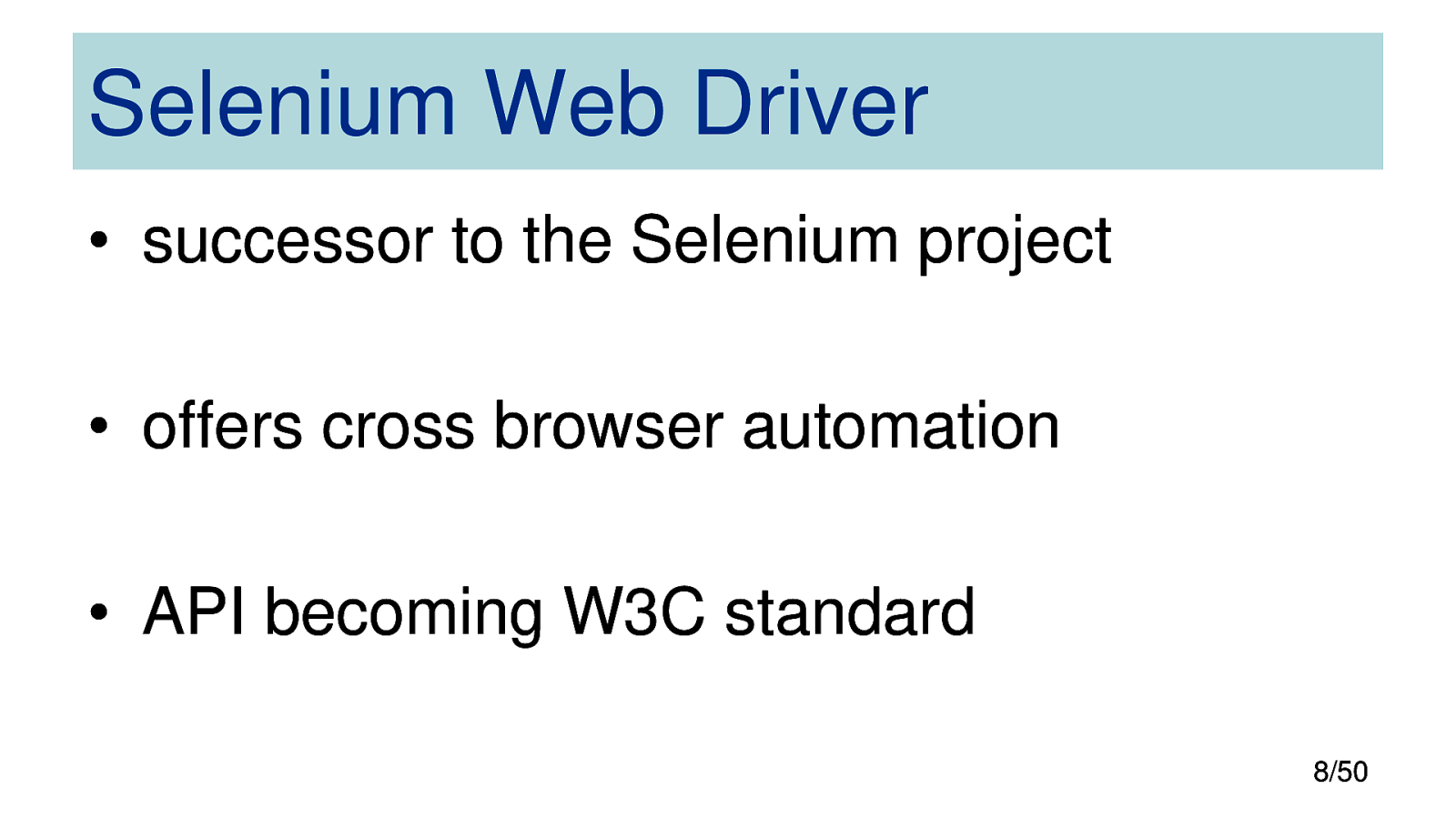
Selenium Web Driver • successor to the Selenium project • offers cross browser automation • API becoming W3C standard 8/50
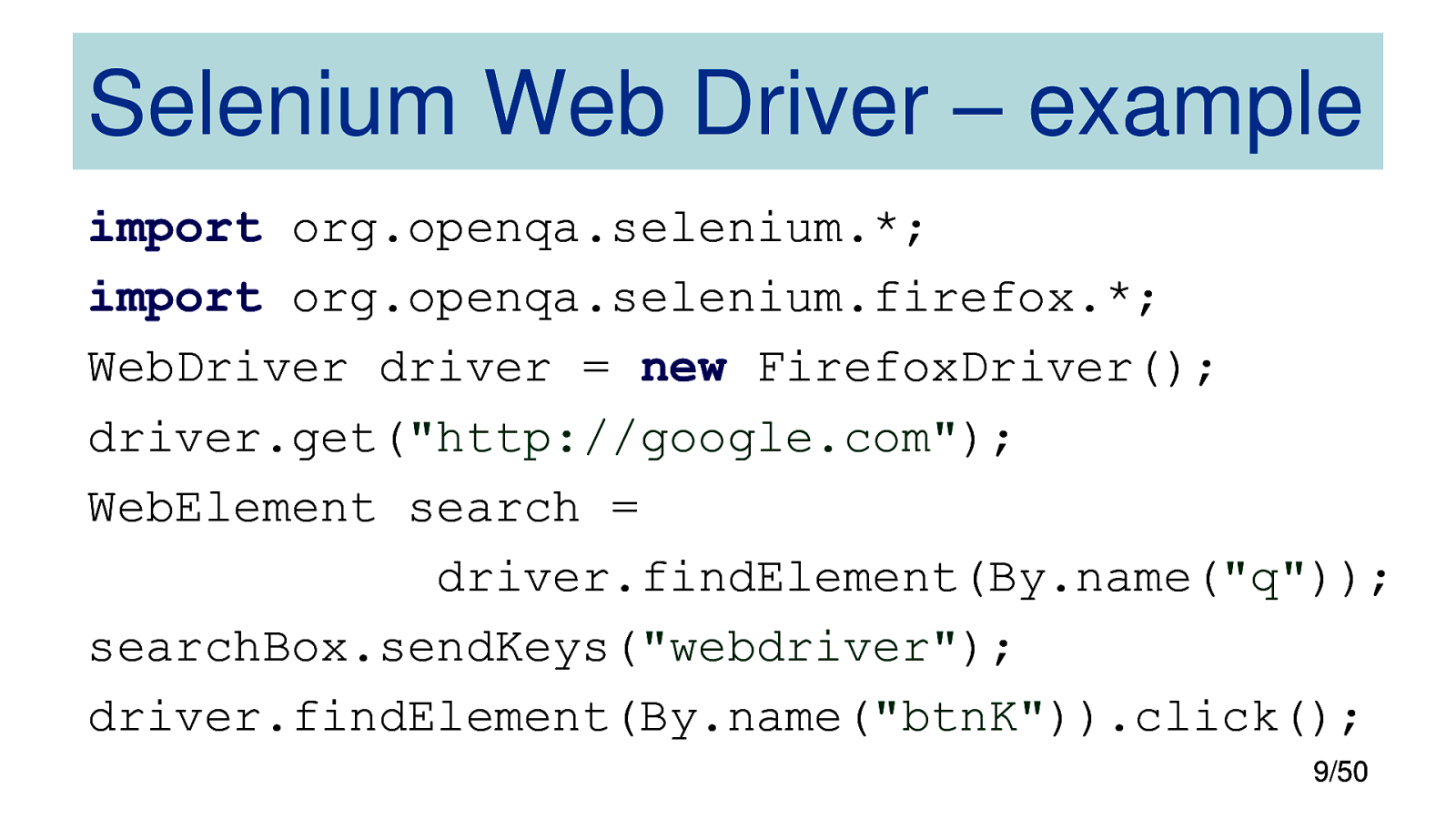
Selenium Web Driver – example import org.openqa.selenium.; import org.openqa.selenium.firefox.; WebDriver driver = new FirefoxDriver(); driver.get(“http://google.com”); WebElement search = driver.findElement(By.name(“q”)); searchBox.sendKeys(“webdriver”); driver.findElement(By.name(“btnK”)).click(); 9/50
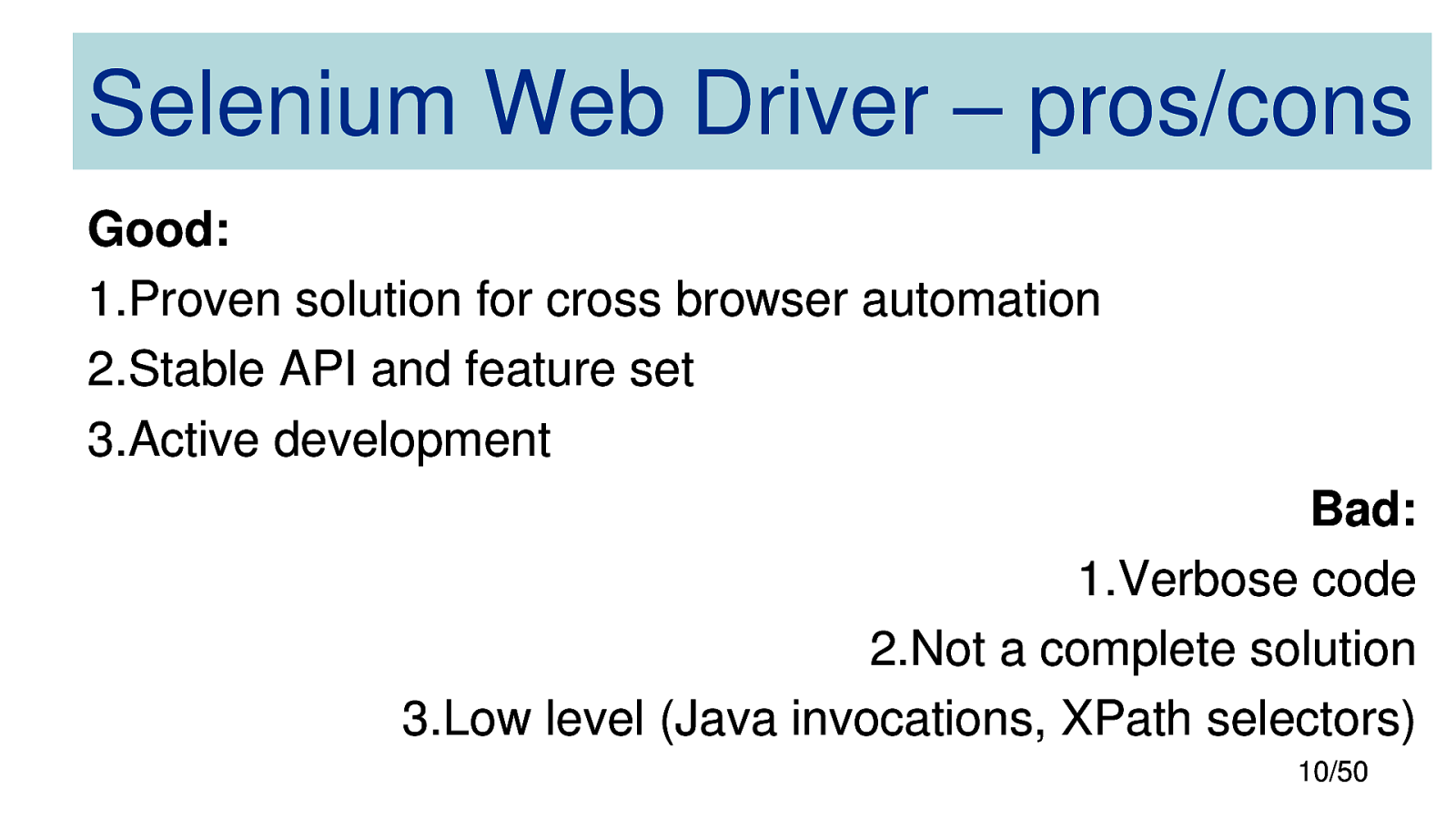
Selenium Web Driver – pros/cons Good: 1.Proven solution for cross browser automation 2.Stable API and feature set 3.Active development Bad: 1.Verbose code 2.Not a complete solution 3.Low level (Java invocations, XPath selectors) 10/50

Groovy
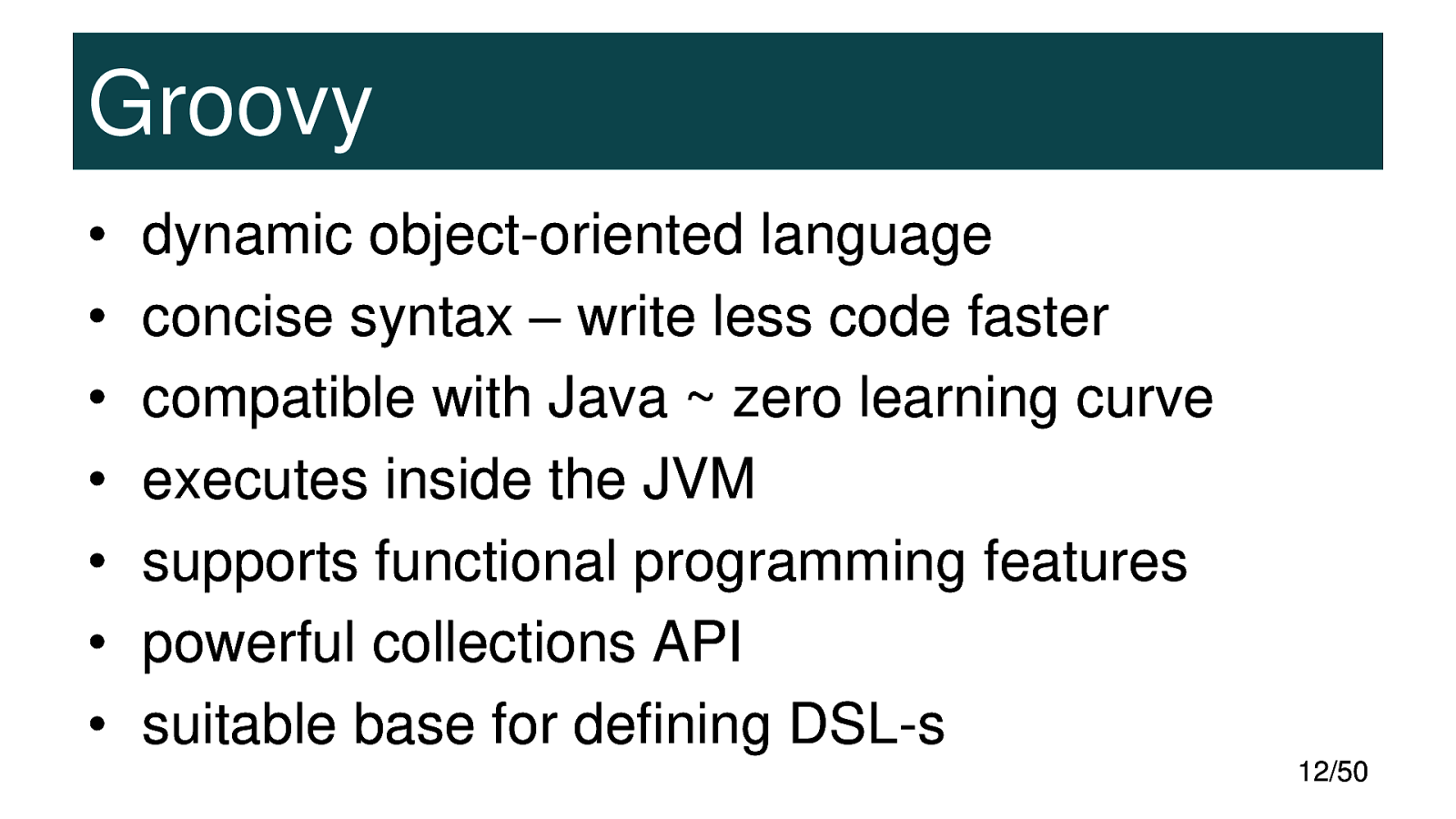
Groovy • • • • • • • dynamic object-oriented language concise syntax – write less code faster compatible with Java ~ zero learning curve executes inside the JVM supports functional programming features powerful collections API suitable base for defining DSL-s 12/50
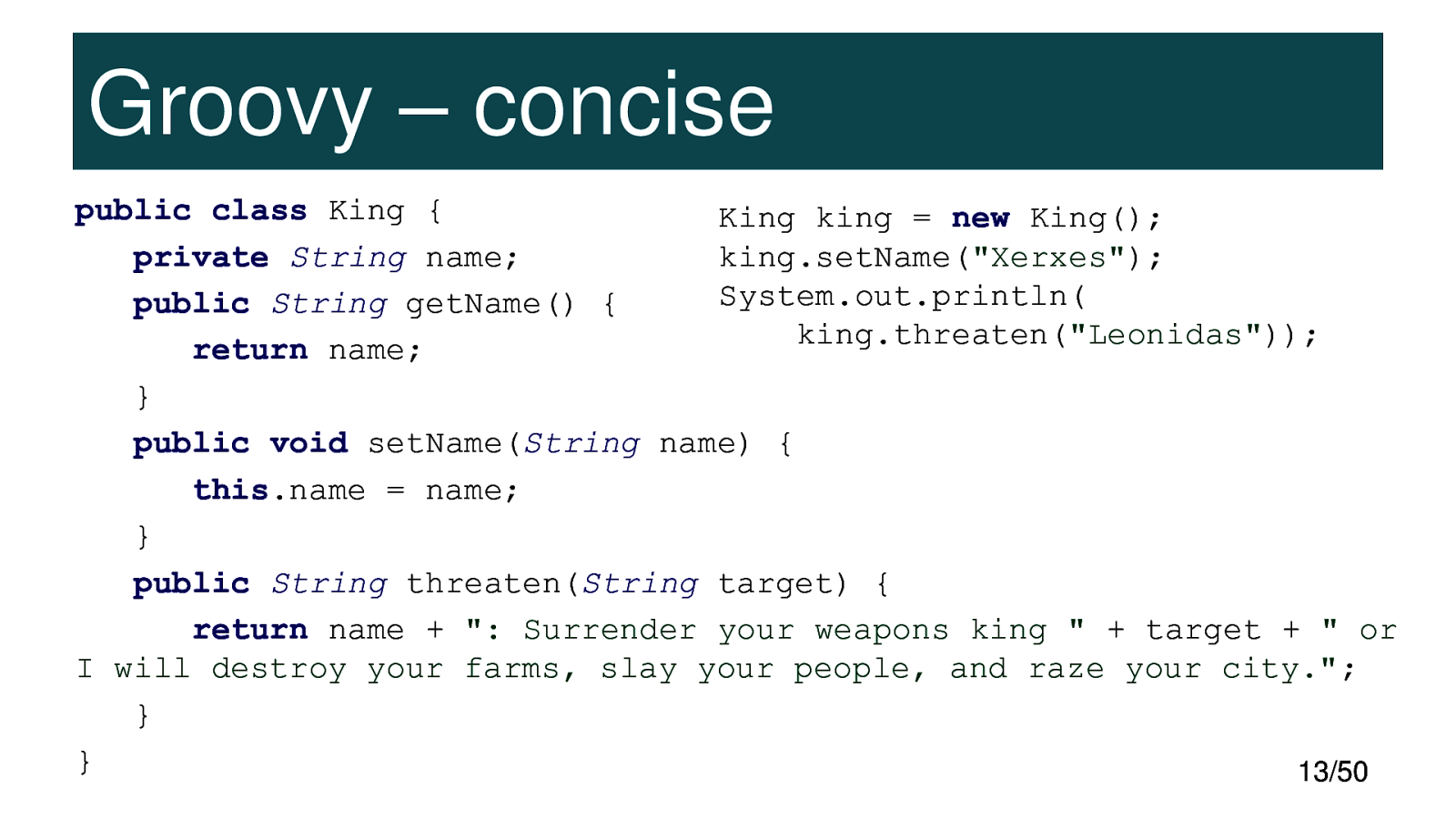
Groovy – concise public class King { King king = new King(); private String name; king.setName(“Xerxes”); System.out.println( public String getName() { king.threaten(“Leonidas”)); return name; } public void setName(String name) { this.name = name; } public String threaten(String target) { return name + “: Surrender your weapons king ” + target + ” or I will destroy your farms, slay your people, and raze your city.”; } } 13/50
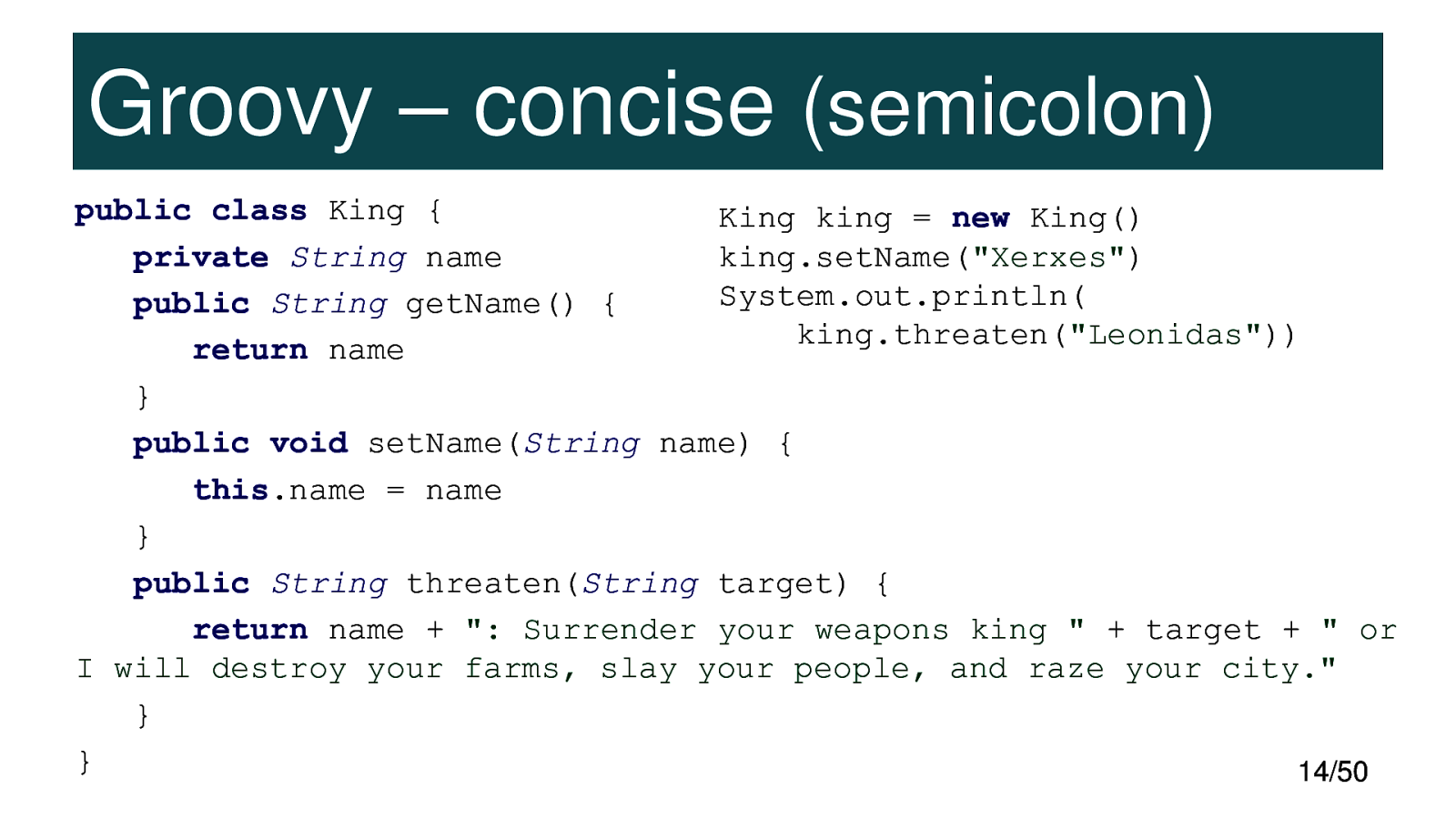
Groovy – concise (semicolon) public class King { King king = new King() private String name king.setName(“Xerxes”) System.out.println( public String getName() { king.threaten(“Leonidas”)) return name } public void setName(String name) { this.name = name } public String threaten(String target) { return name + “: Surrender your weapons king ” + target + ” or I will destroy your farms, slay your people, and raze your city.” } } 14/50

Groovy – concise (parentheses) public class King { King king = new King() private String name king.setName “Xerxes” System.out.println public String getName() { king.threaten(“Leonidas”) return name } public void setName(String name) { this.name = name } public String threaten(String target) { return name + “: Surrender your weapons king ” + target + ” or I will destroy your farms, slay your people, and raze your city.” } } 15/50
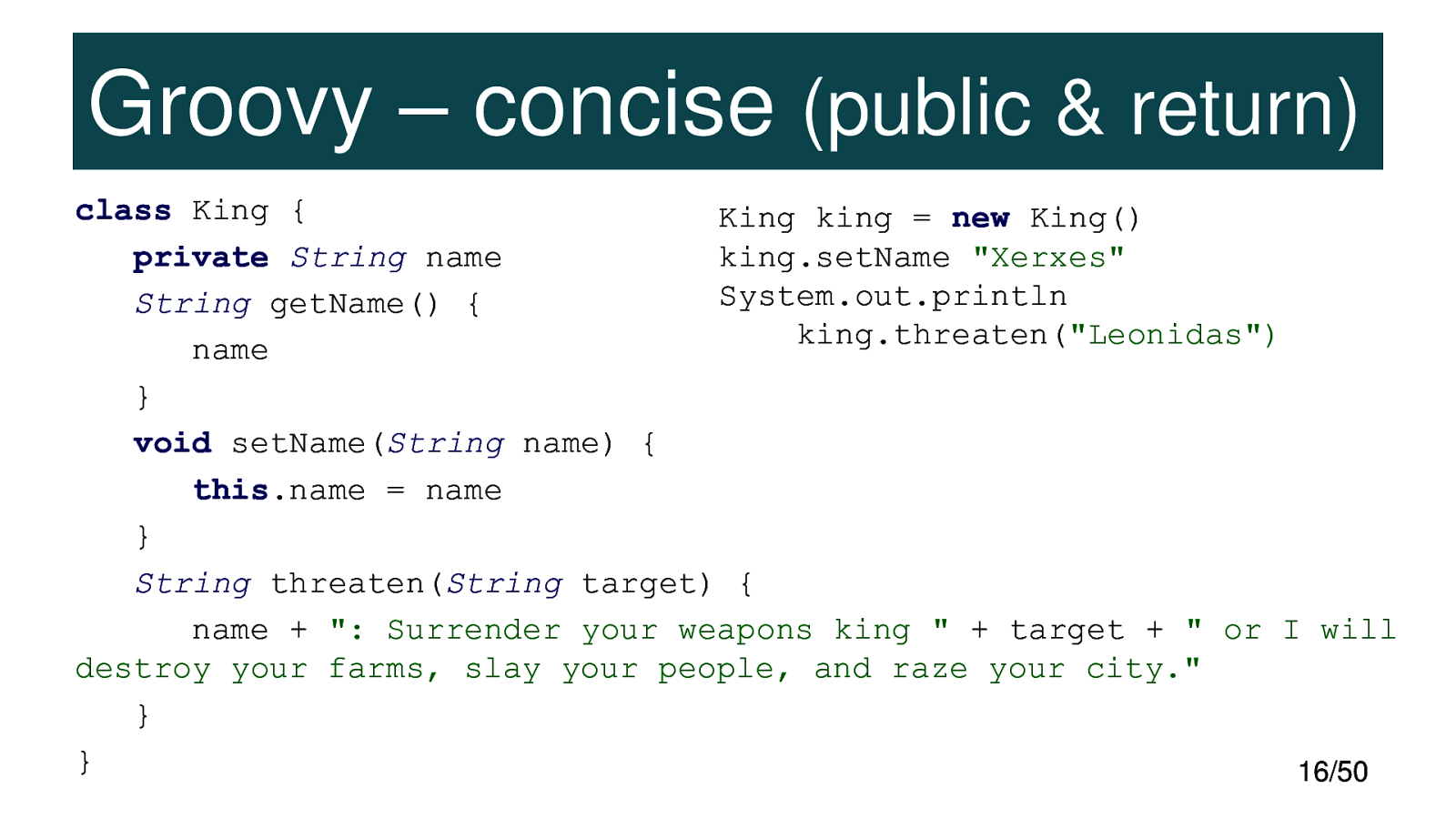
Groovy – concise (public & return) class King { King king = new King() private String name king.setName “Xerxes” System.out.println String getName() { king.threaten(“Leonidas”) name } void setName(String name) { this.name = name } String threaten(String target) { name + “: Surrender your weapons king ” + target + ” or I will destroy your farms, slay your people, and raze your city.” } } 16/50
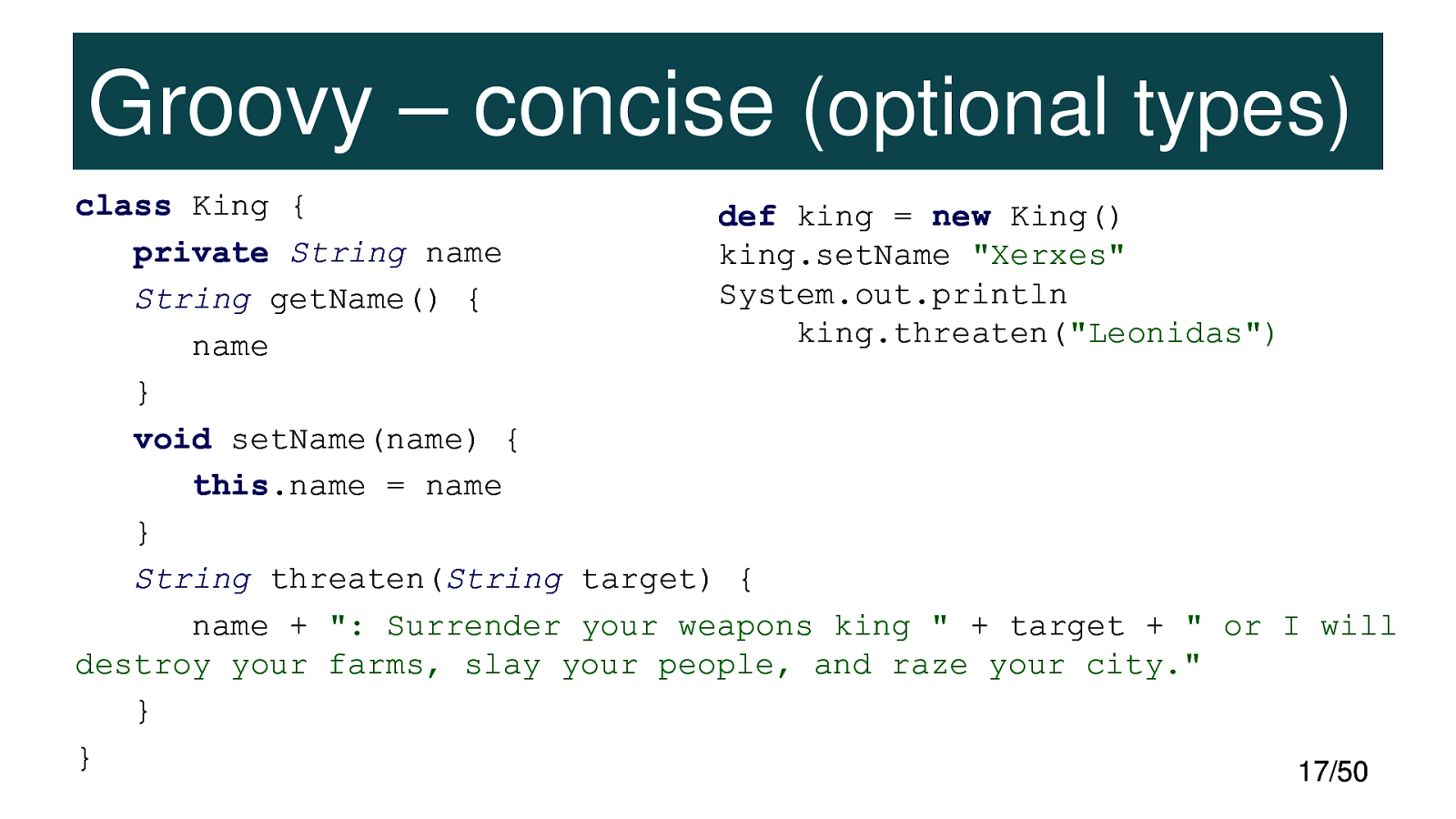
Groovy – concise (optional types) class King { def king = new King() private String name king.setName “Xerxes” System.out.println String getName() { king.threaten(“Leonidas”) name } void setName(name) { this.name = name } String threaten(String target) { name + “: Surrender your weapons king ” + target + ” or I will destroy your farms, slay your people, and raze your city.” } } 17/50
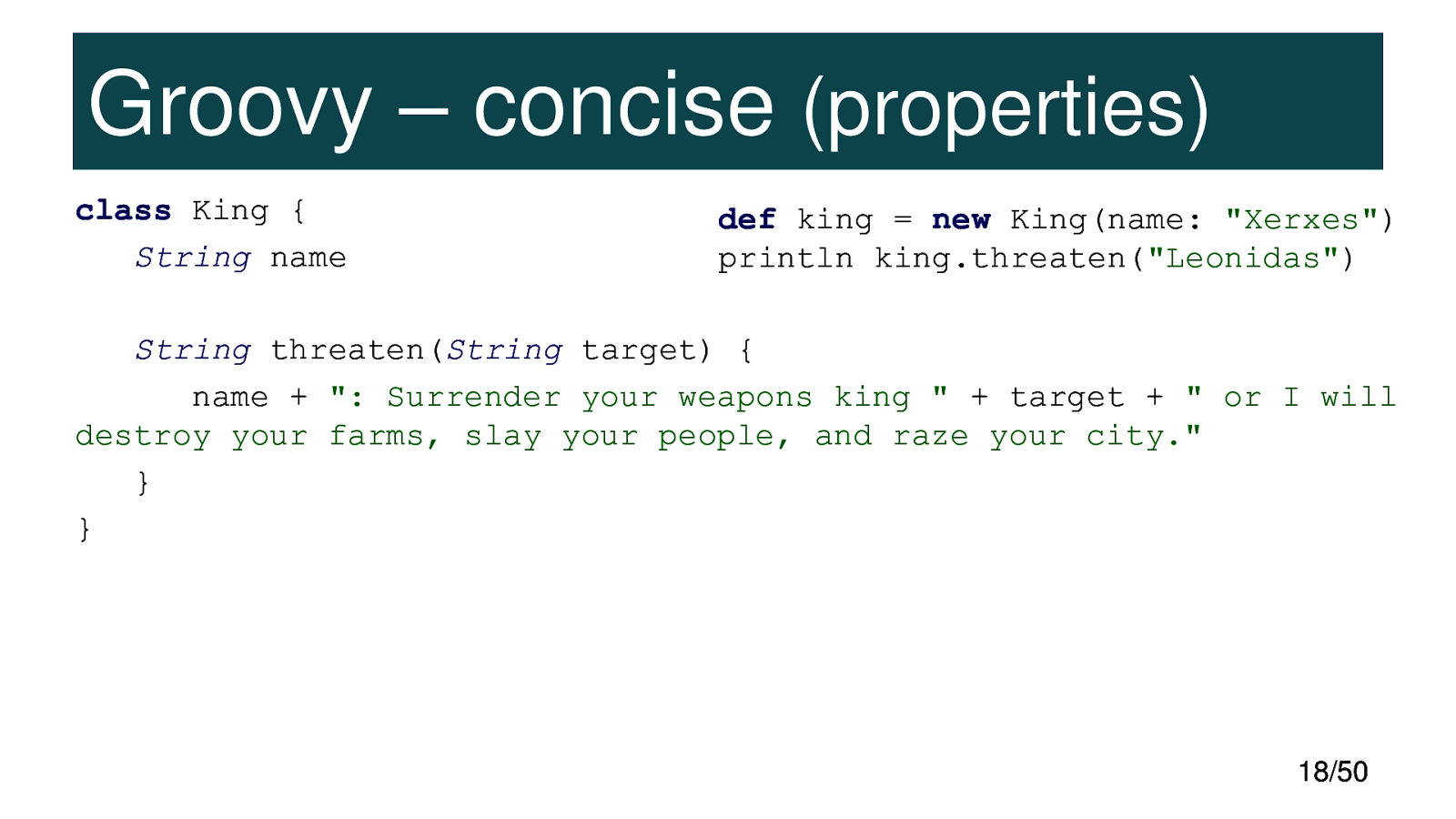
Groovy – concise (properties) class King { String name def king = new King(name: “Xerxes”) println king.threaten(“Leonidas”) String threaten(String target) { name + “: Surrender your weapons king ” + target + ” or I will destroy your farms, slay your people, and raze your city.” } } 18/50
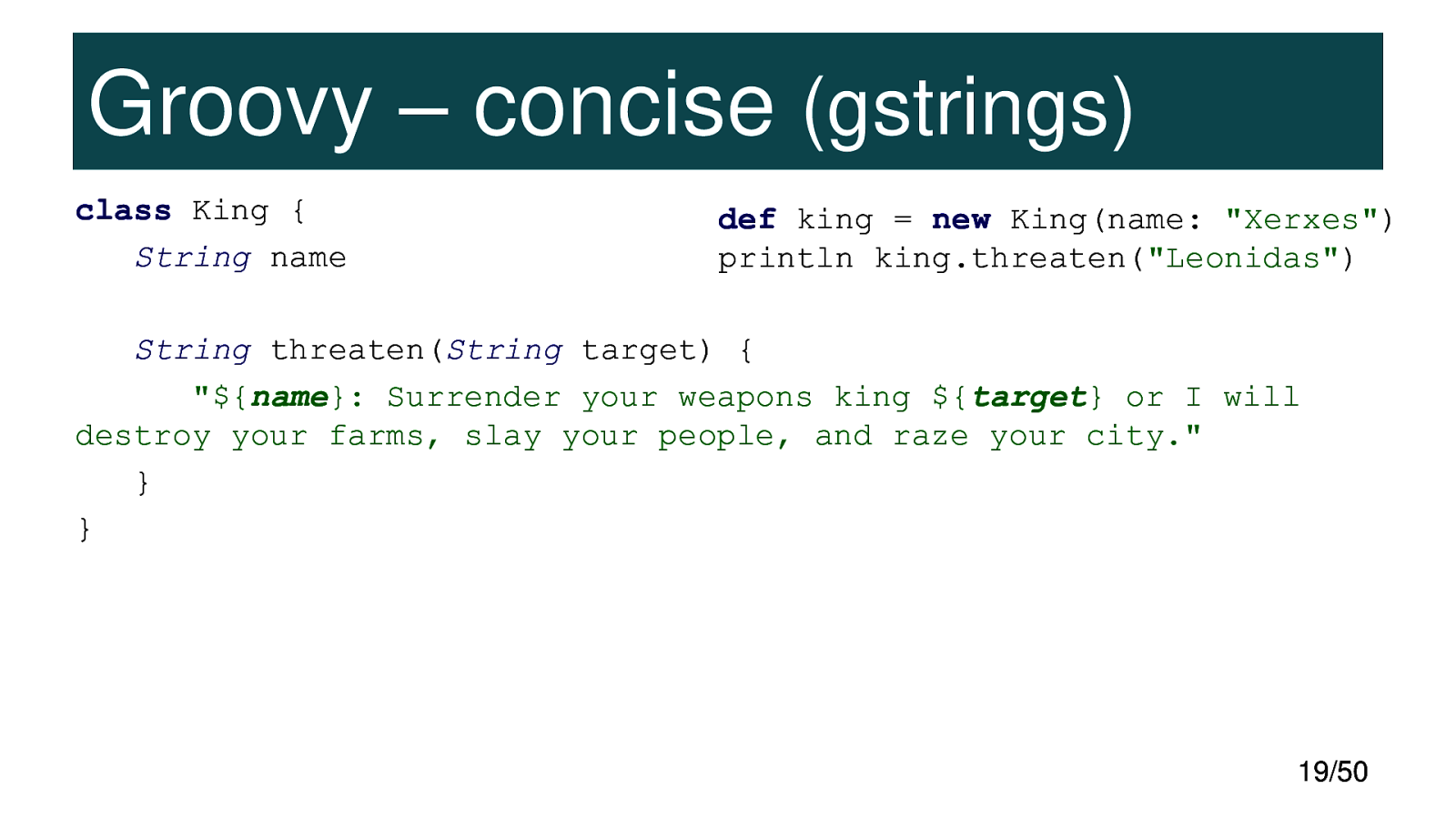
Groovy – concise (gstrings) class King { String name def king = new King(name: “Xerxes”) println king.threaten(“Leonidas”) String threaten(String target) { “${name}: Surrender your weapons king ${target} or I will destroy your farms, slay your people, and raze your city.” } } 19/50
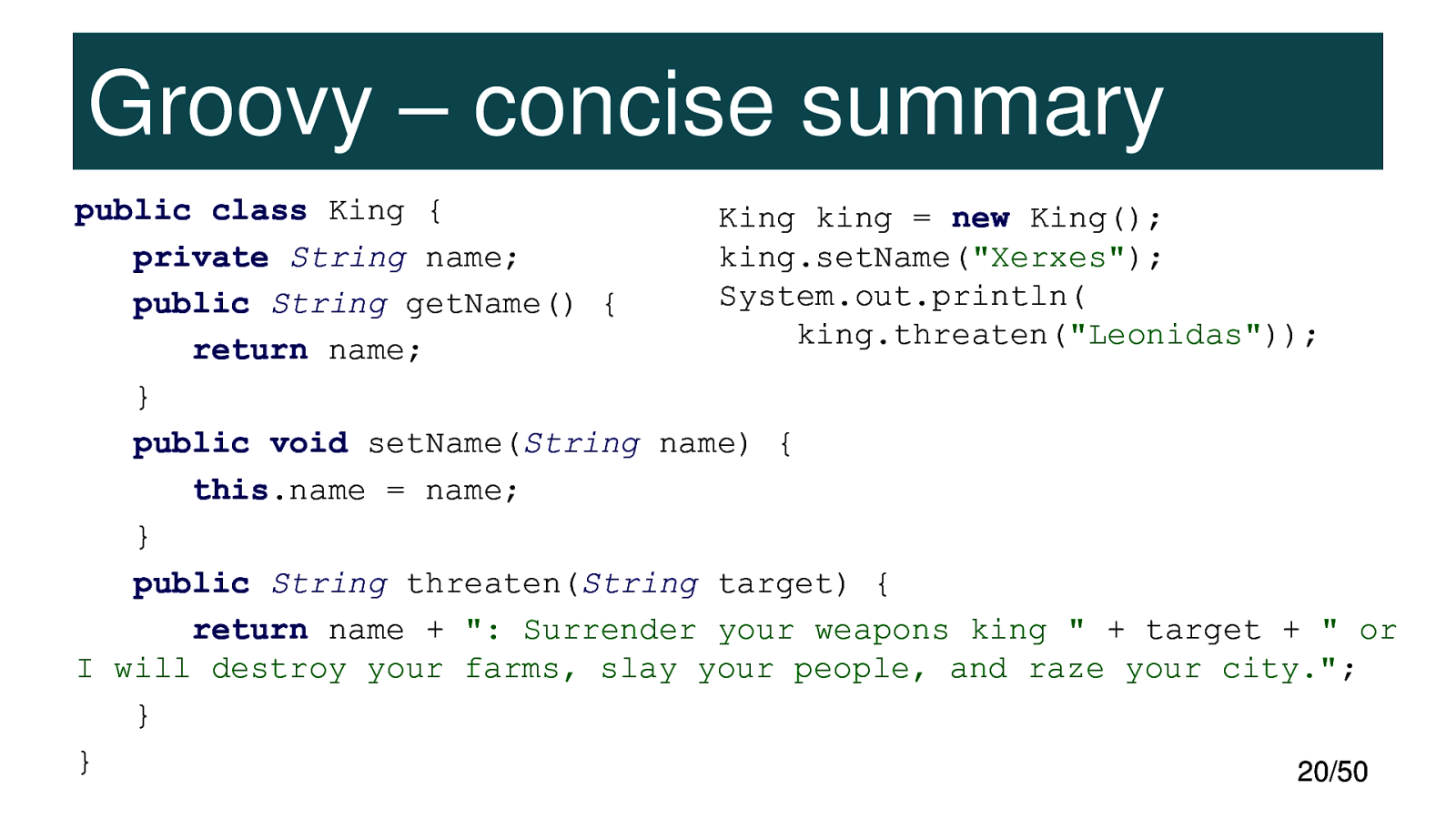
Groovy – concise summary public class King { King king = new King(); private String name; king.setName(“Xerxes”); { System.out.println( public class StringKing getName() { king.threaten(“Leonidas”)); return String name; name String threaten(String target) { } “${name}: Comename) and get public void setName(String { them, ${target}.” } = name; this.name } } king = new King(name: “Leonidas”) public def String threaten(String target) { println return name king.threaten(“Xerxes”) + “: Surrender your weapons king ” + target + ” or I will destroy your farms, slay your people, and raze your city.”; } } 20/50

Surrender your weapons king Leonidas or I will destroy your farms, slay your people, and raze your city. Come and get them, Xerxes
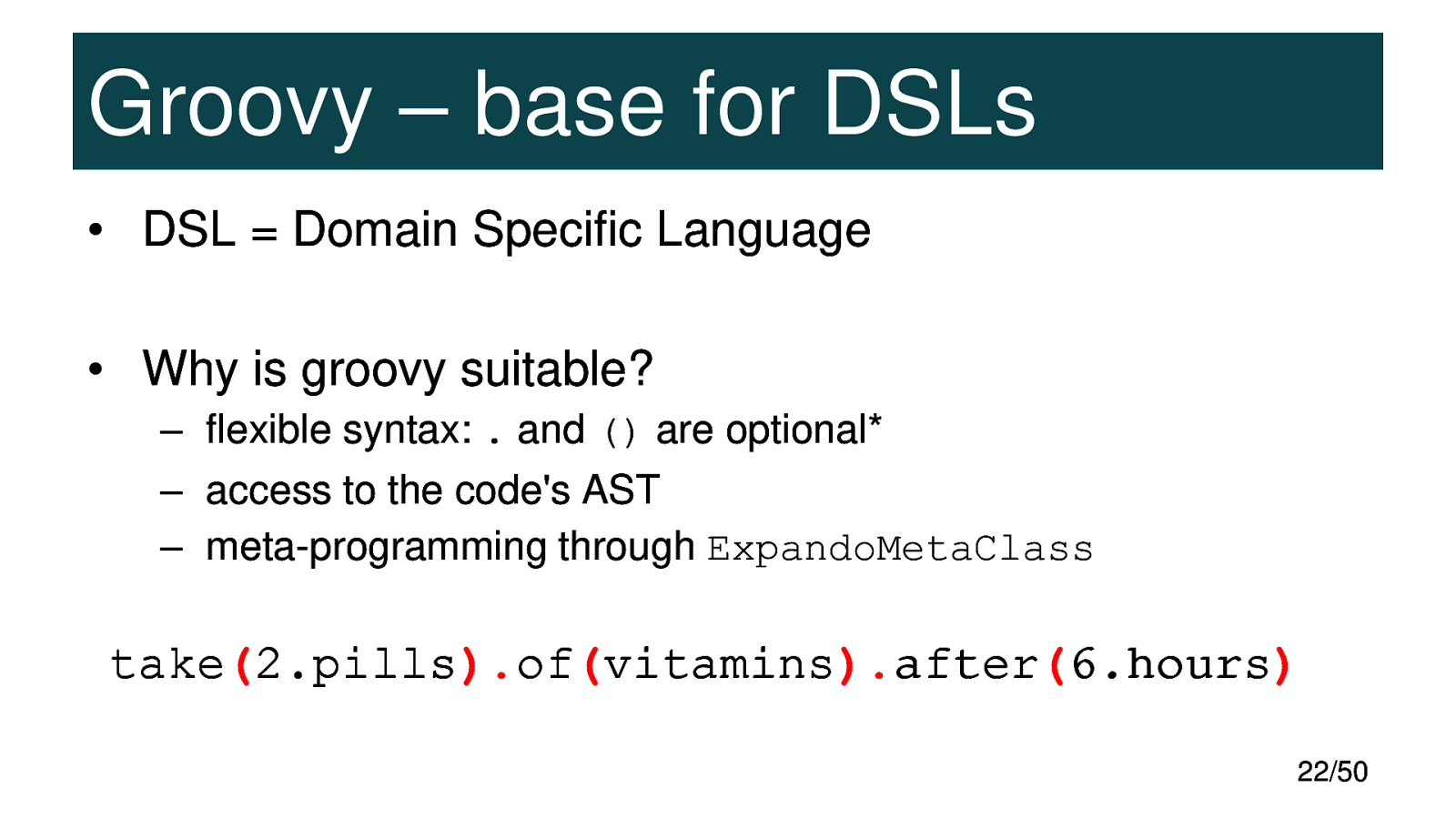
Groovy – base for DSLs • DSL = Domain Specific Language • Why is groovy suitable? – flexible syntax: . and () are optional* – access to the code’s AST – meta-programming through ExpandoMetaClass take 2.pills of vitamins after 6.hours take(2.pills).of(vitamins).after(6.hours) 22/50

Spock
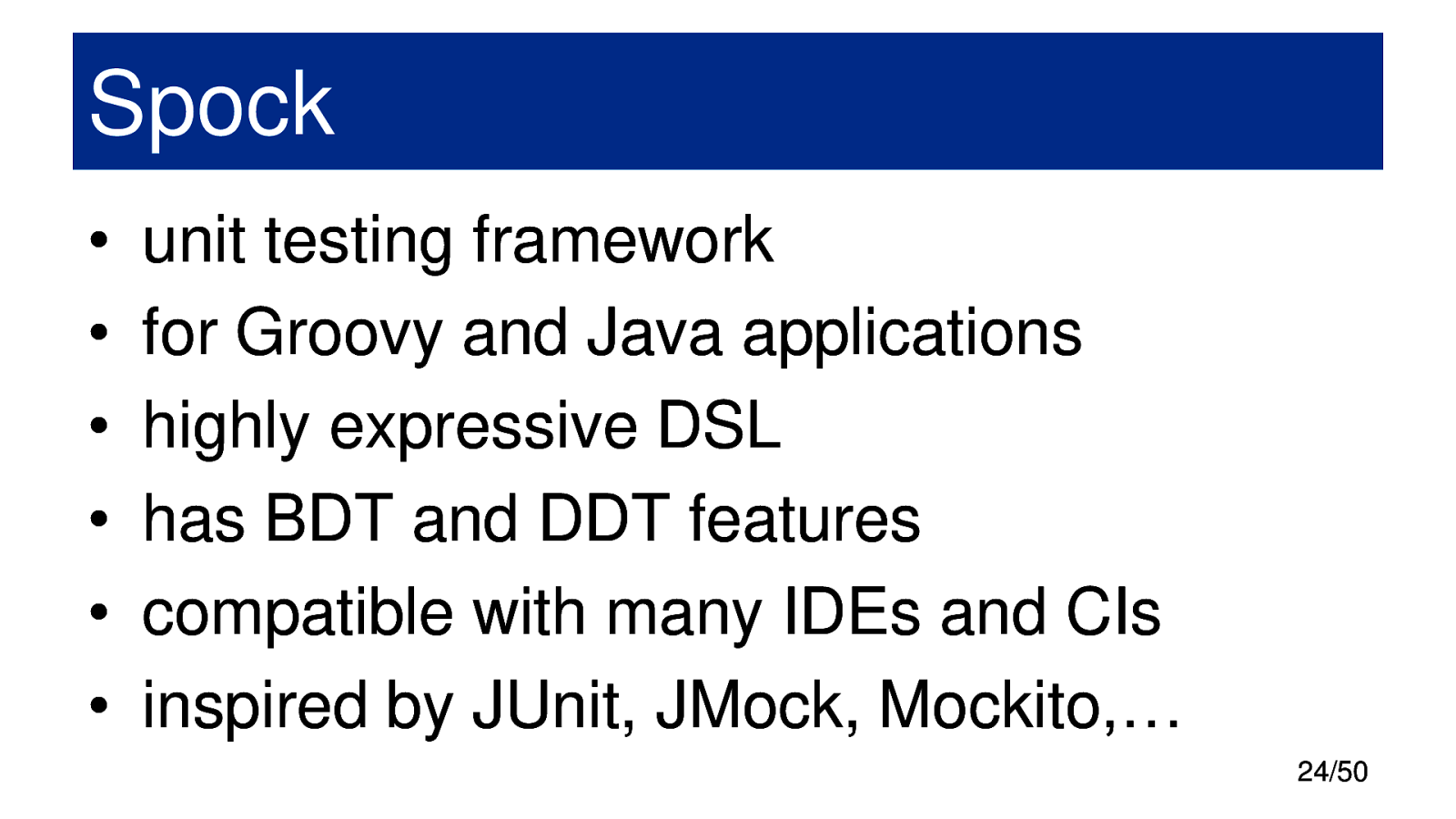
Spock • • • • • • unit testing framework for Groovy and Java applications highly expressive DSL has BDT and DDT features compatible with many IDEs and CIs inspired by JUnit, JMock, Mockito,… 24/50
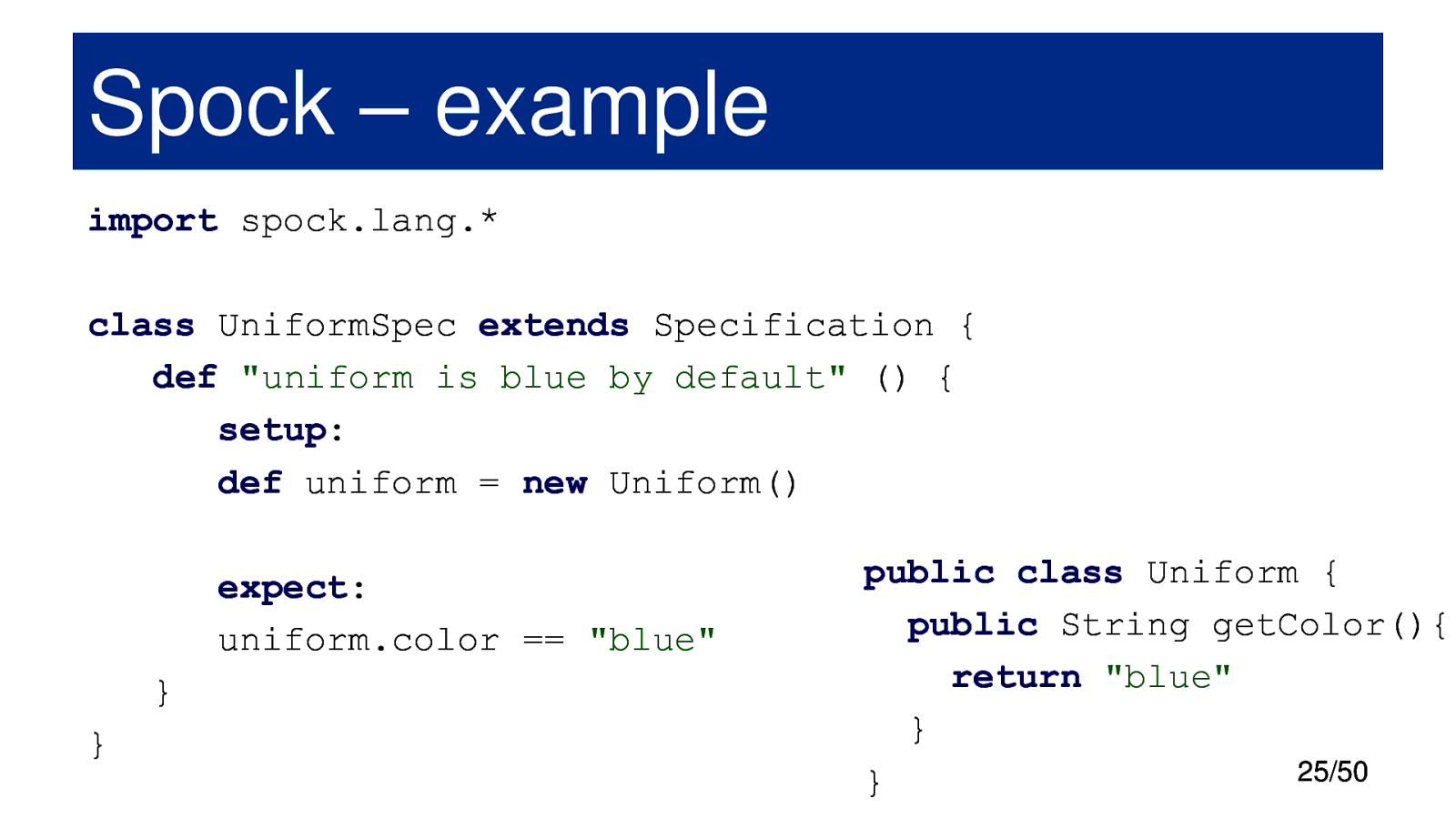
Spock – example import spock.lang.* class UniformSpec extends Specification { def “uniform is blue by default” () { setup: def uniform = new Uniform() expect: uniform.color == “blue” } } public class Uniform { public String getColor(){ return “blue” } 25/50 }
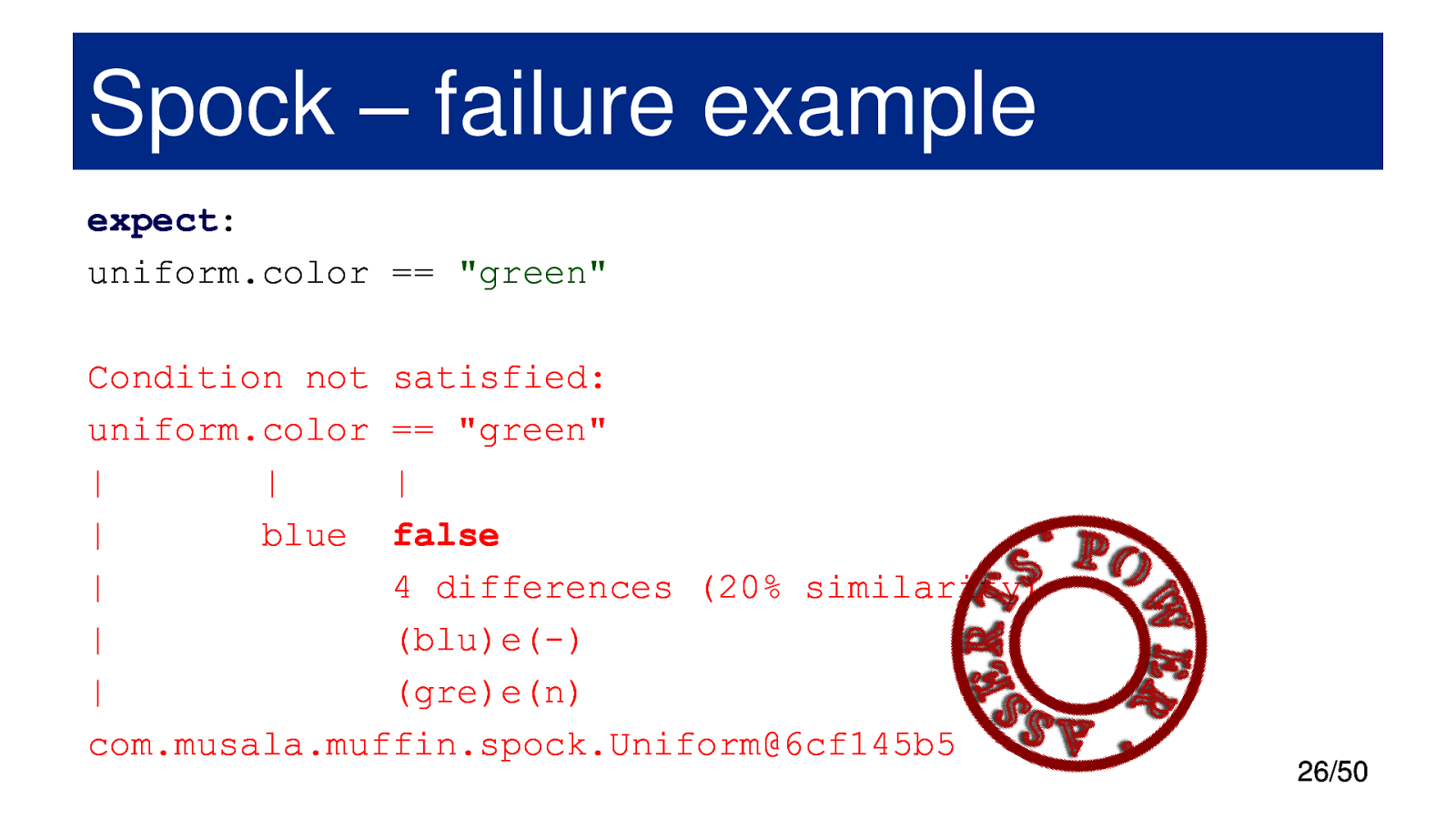
Spock – failure example expect: uniform.color == “green” Condition not satisfied: uniform.color == “green” | | | | blue false | 4 differences (20% similarity) | (blu)e(-) | (gre)e(n) com.musala.muffin.spock.Uniform@6cf145b5 26/50
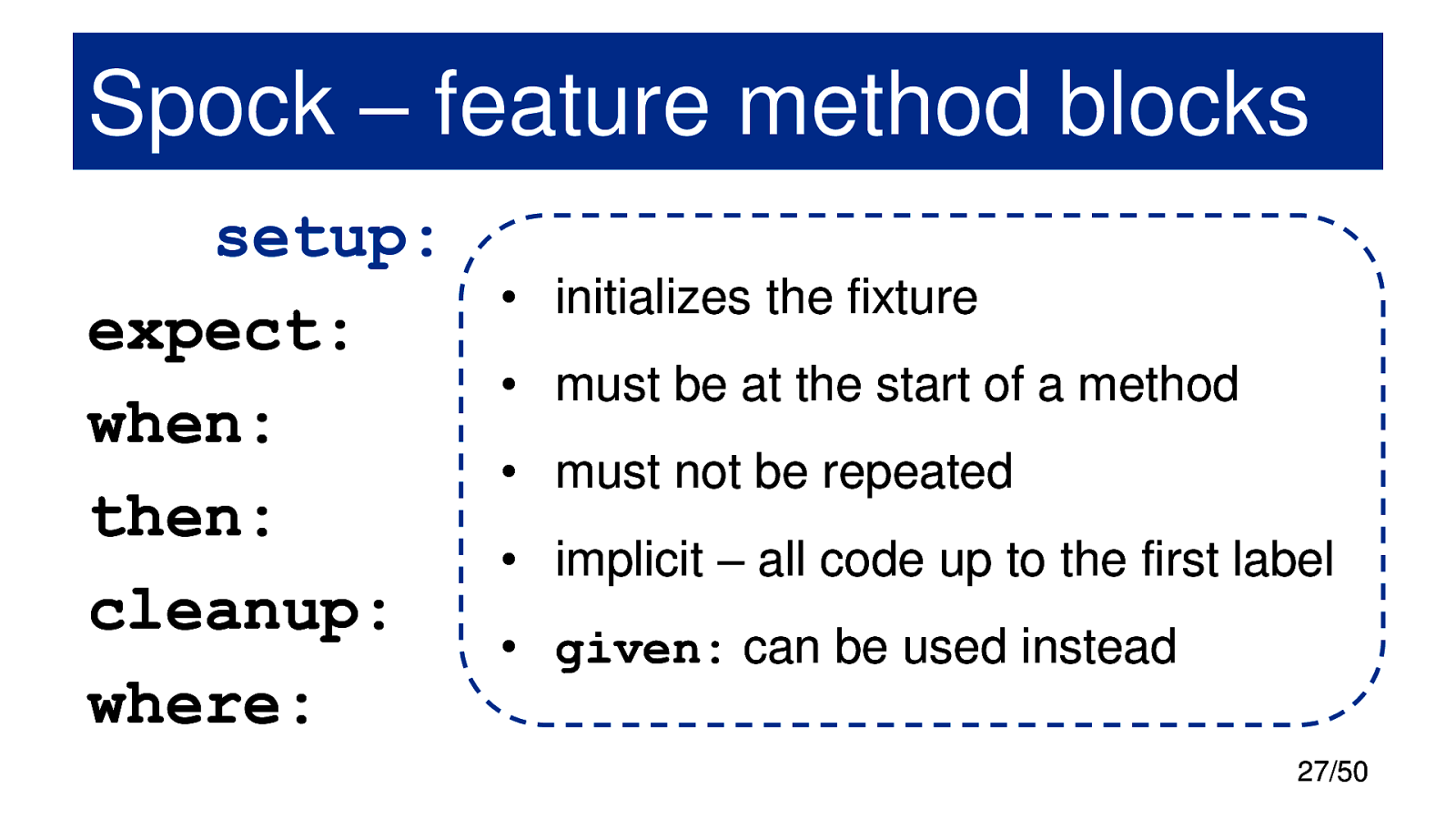
Spock – feature method blocks setup: expect: when: then: cleanup: where: • initializes the fixture • must be at the start of a method • must not be repeated • implicit – all code up to the first label • given: can be used instead 27/50
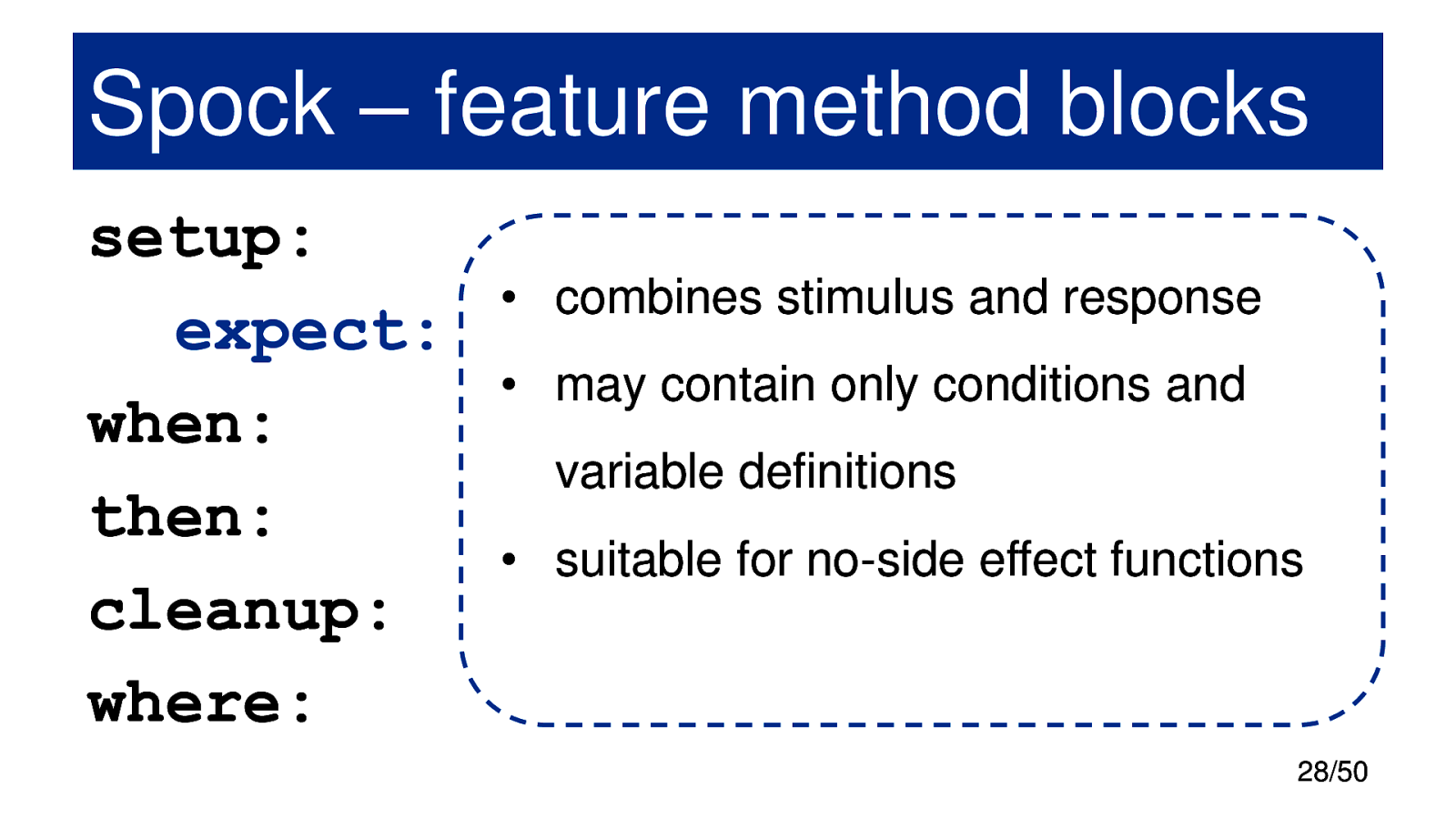
Spock – feature method blocks setup: expect: when: then: cleanup: where: • combines stimulus and response • may contain only conditions and variable definitions • suitable for no-side effect functions 28/50
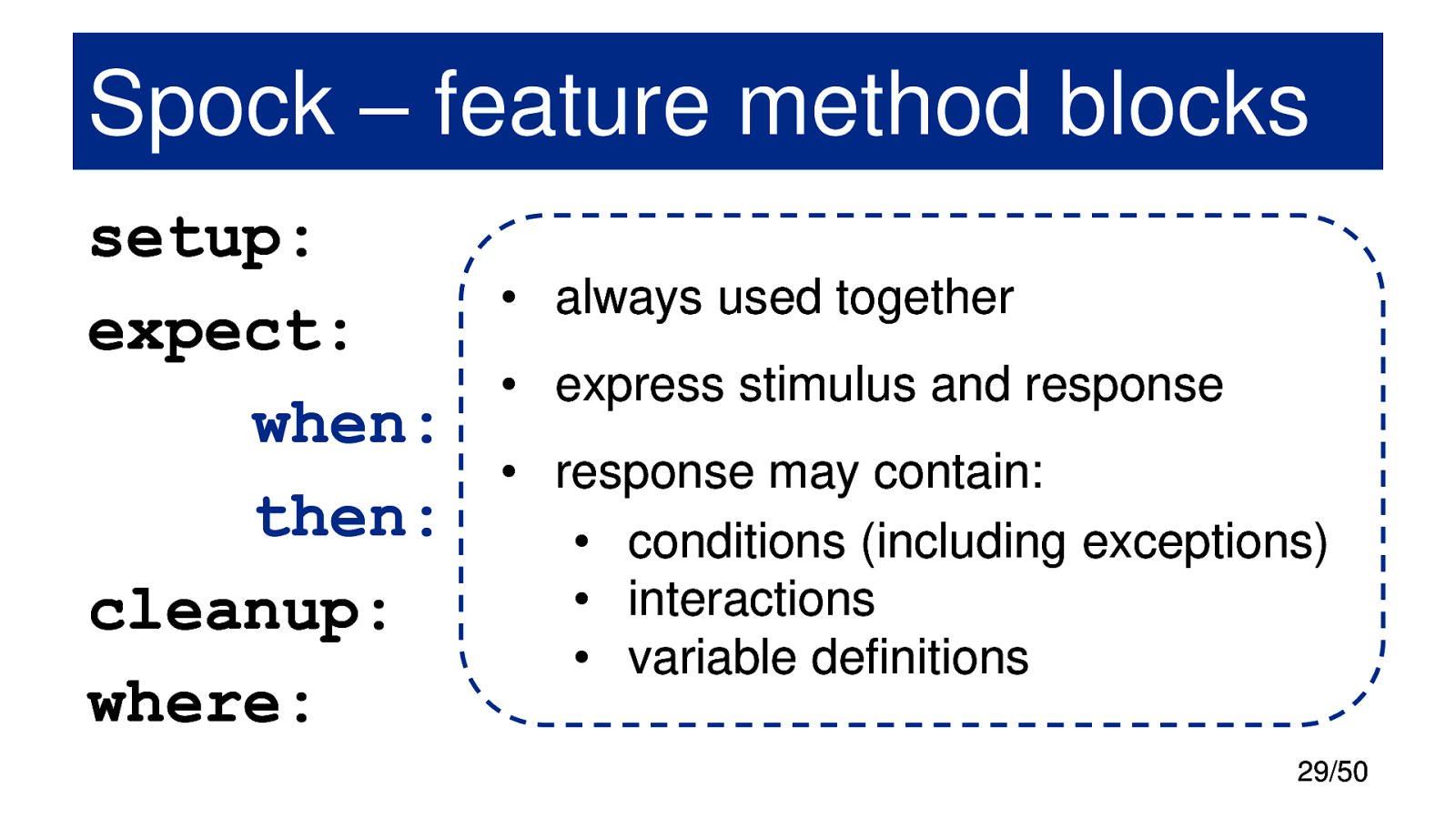
Spock – feature method blocks setup: expect: when: then: cleanup: where: • always used together • express stimulus and response • response may contain: • conditions (including exceptions) • interactions • variable definitions 29/50
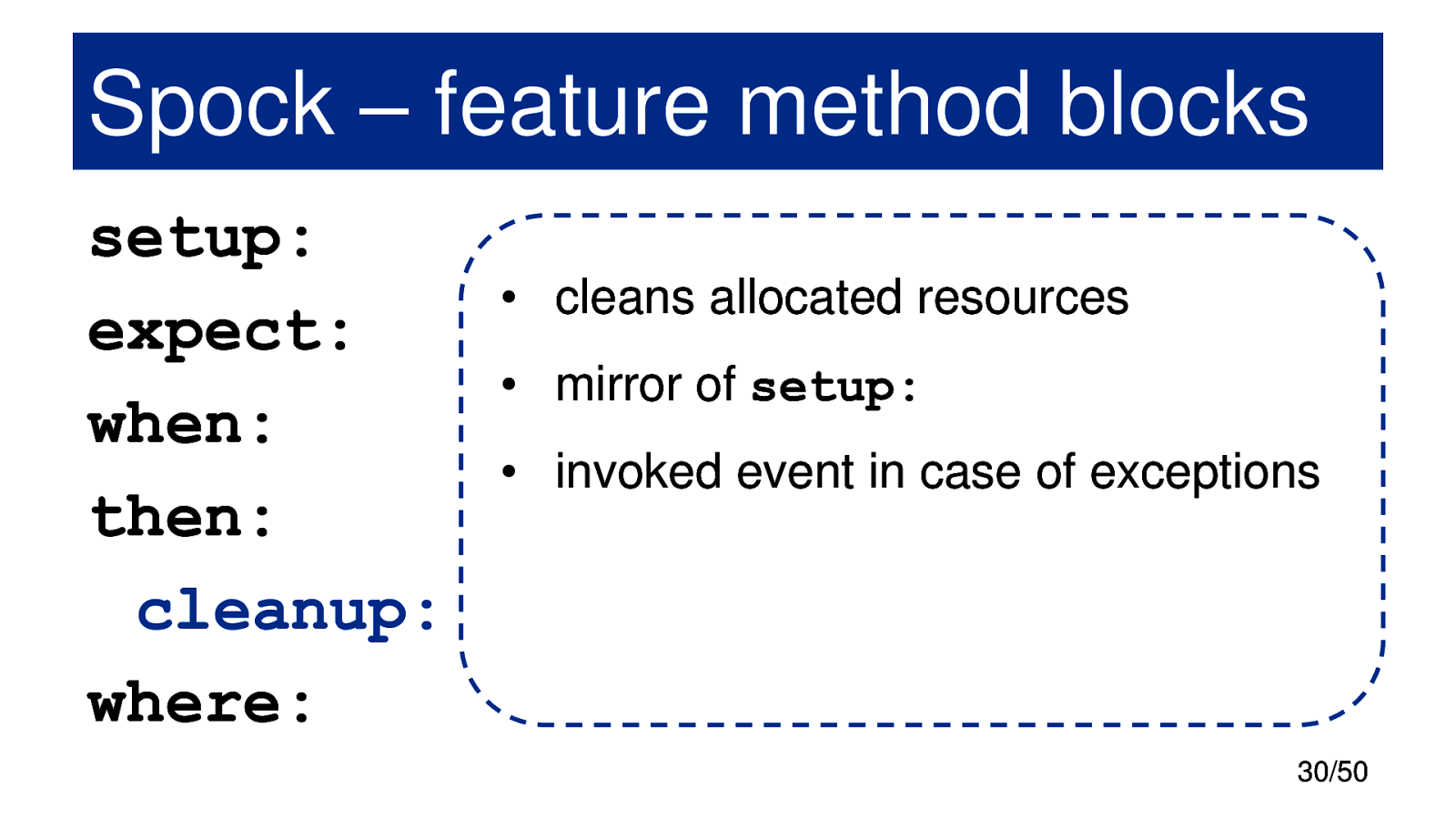
Spock – feature method blocks setup: expect: when: then: cleanup: where: • cleans allocated resources • mirror of setup: • invoked event in case of exceptions 30/50
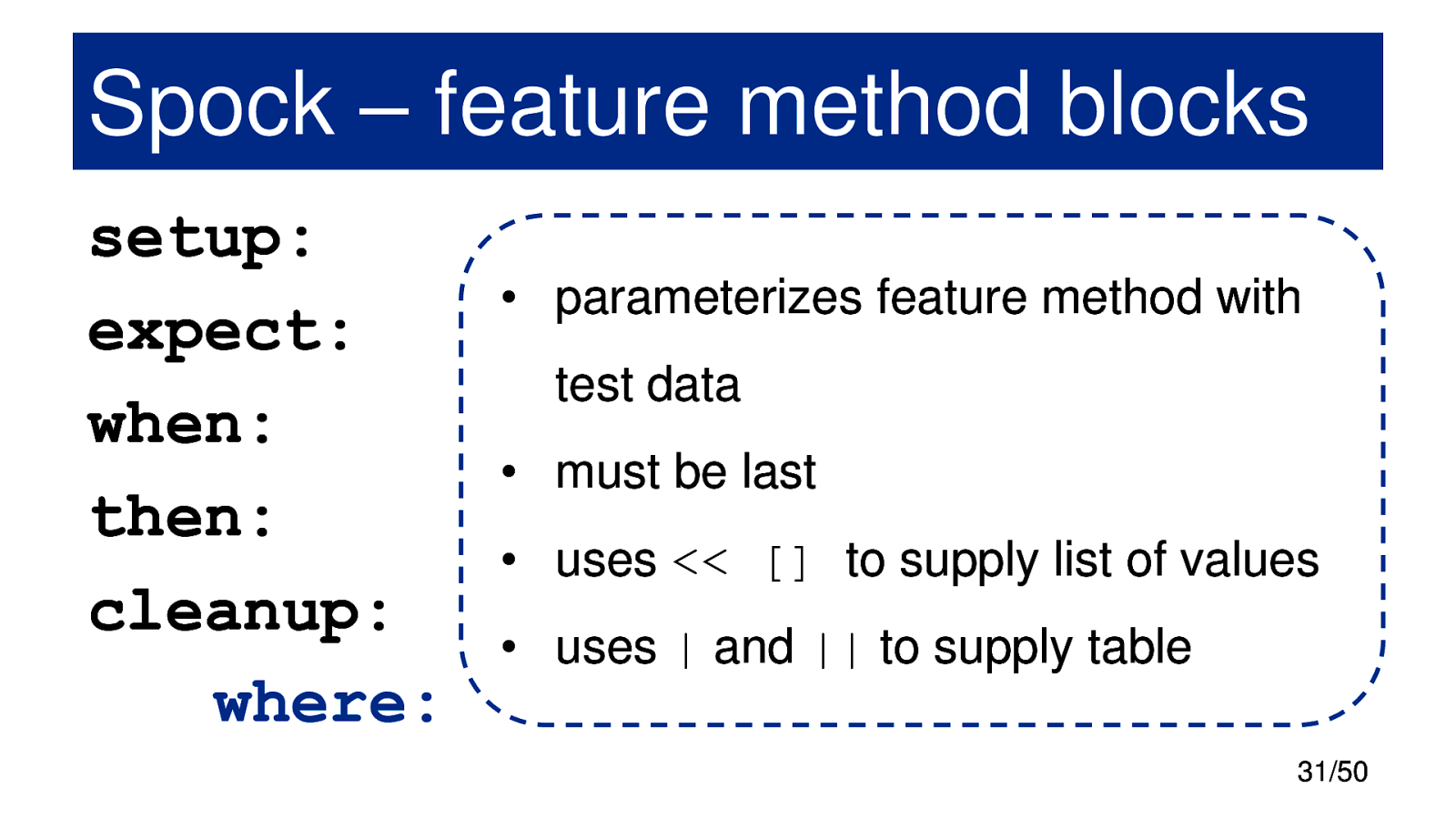
Spock – feature method blocks setup: expect: when: then: cleanup: where: • parameterizes feature method with test data • must be last • uses << [] to supply list of values • uses | and || to supply table 31/50
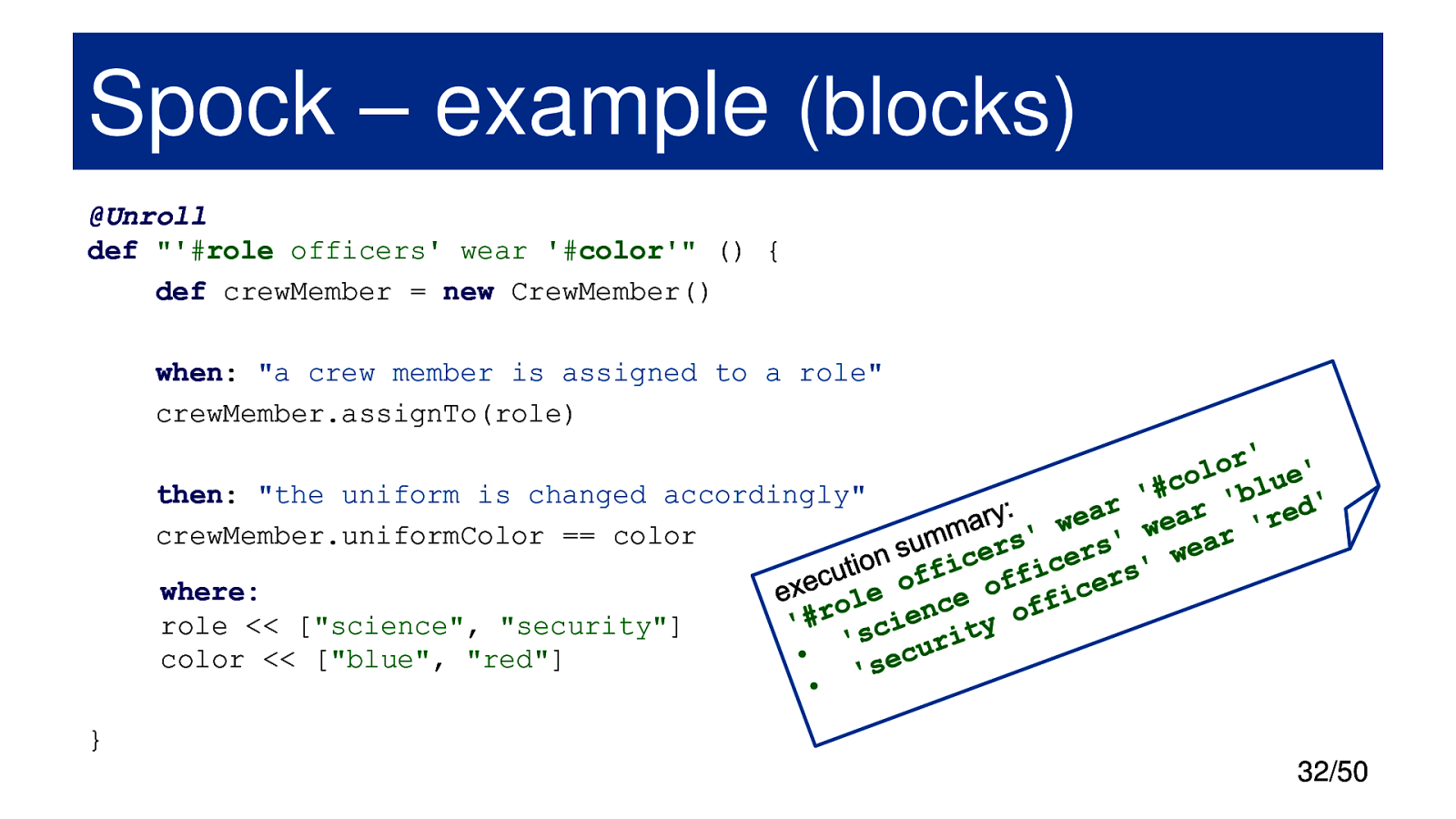
Spock – example (blocks) @Unroll def “’#role officers’ wear ‘#color’” () { def crewMember = new CrewMember() when: “a crew member is assigned to a role” crewMember.assignTo(role) then: “the uniform is changed accordingly” crewMember.uniformColor == color where: role << [“science”, | color “security”] “science” color << [“blue”, | “blue” “red”] “security” | “red” } 32/50
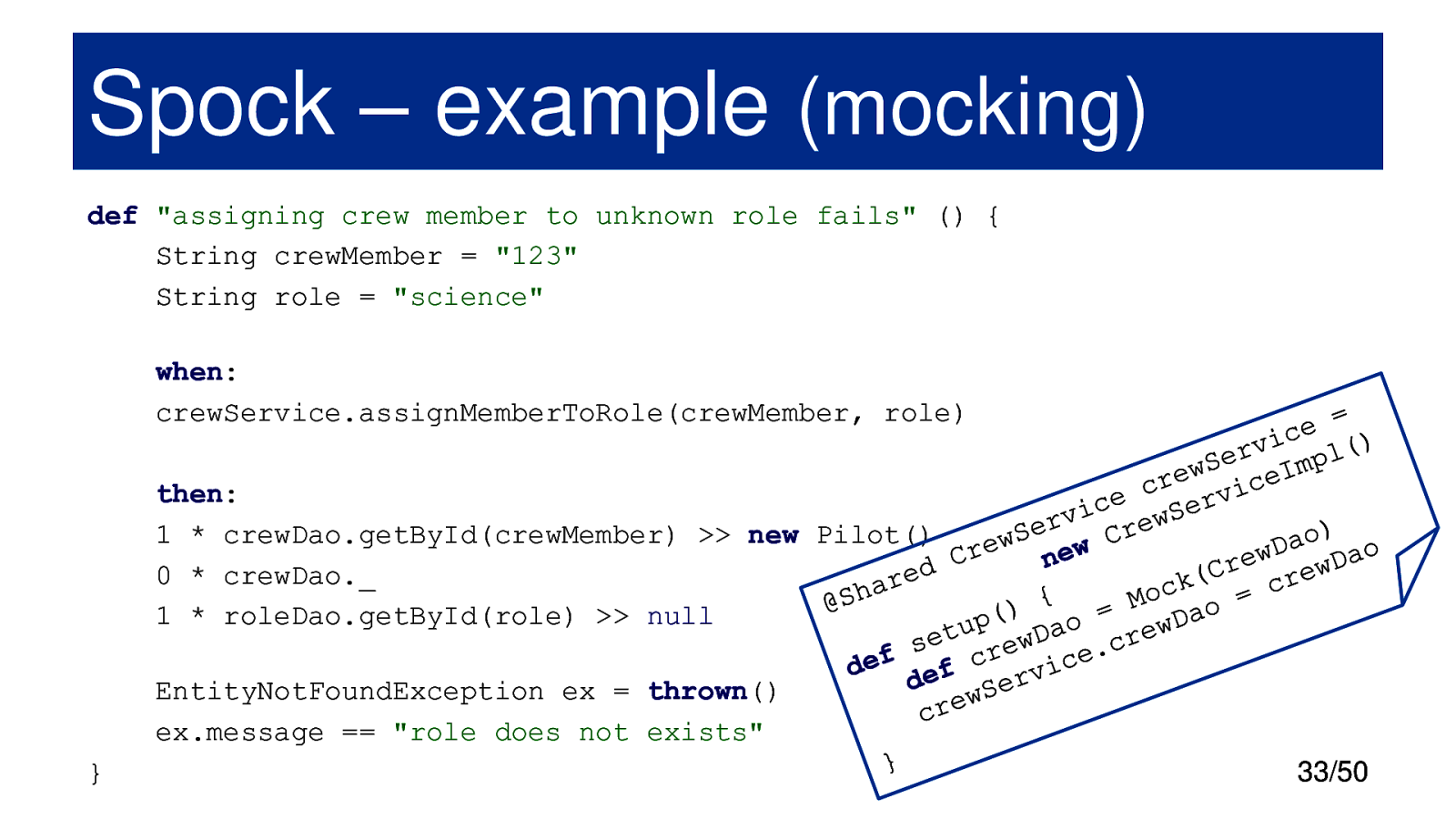
Spock – example (mocking) def “assigning crew member to unknown role fails” () { String crewMember = “123” String role = “science” when: crewService.assignMemberToRole(crewMember, role) then: 1 * crewDao.getById(crewMember) >> new Pilot() 0 * crewDao._ 1 * roleDao.getById(role) >> null EntityNotFoundException ex = thrown() ex.message == “role does not exists” } 33/50
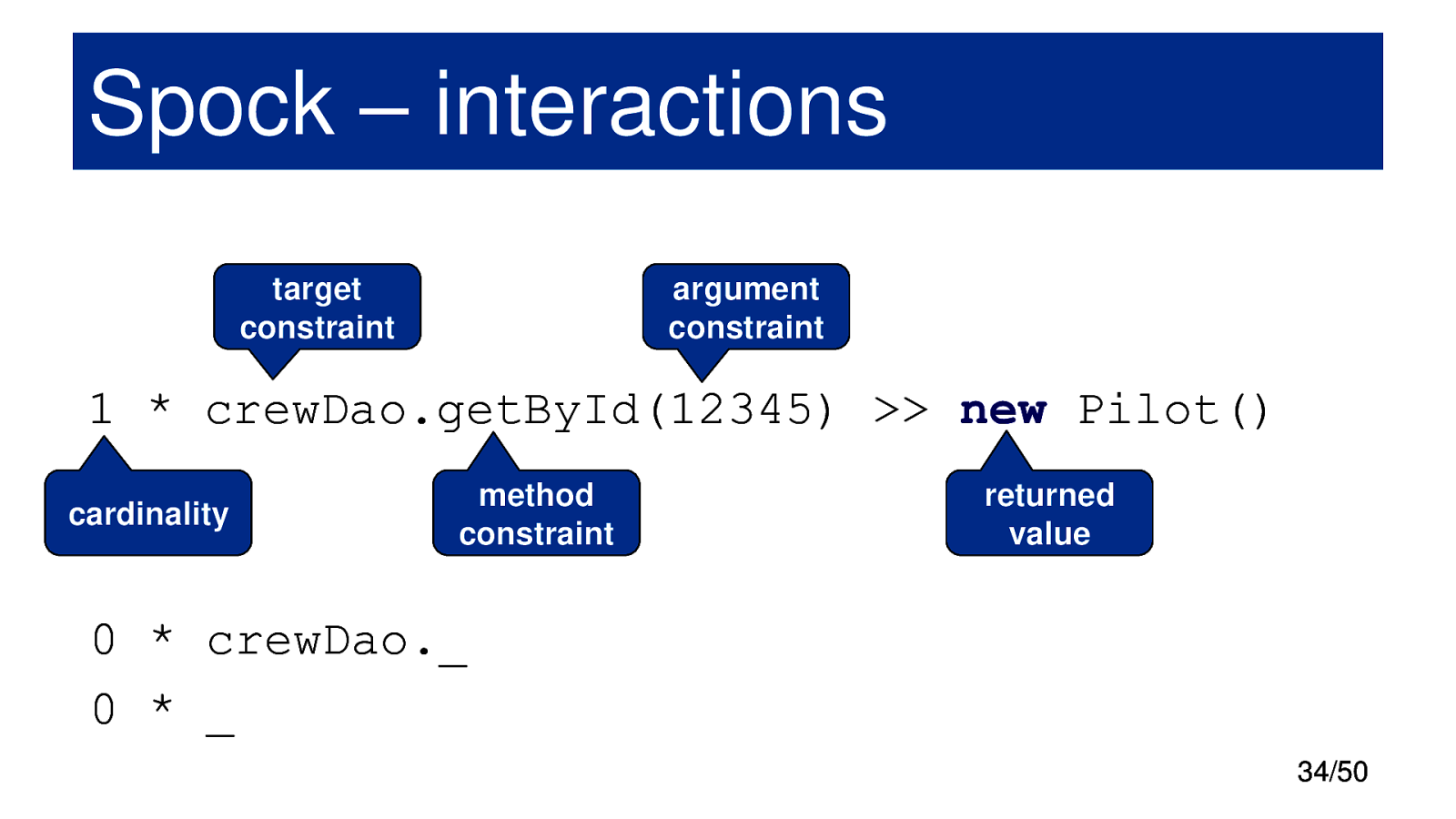
Spock – interactions target constraint argument constraint 1 * crewDao.getById(12345) >> new Pilot() cardinality method constraint returned value 0 * crewDao._ 0 * _ 34/50

Geb
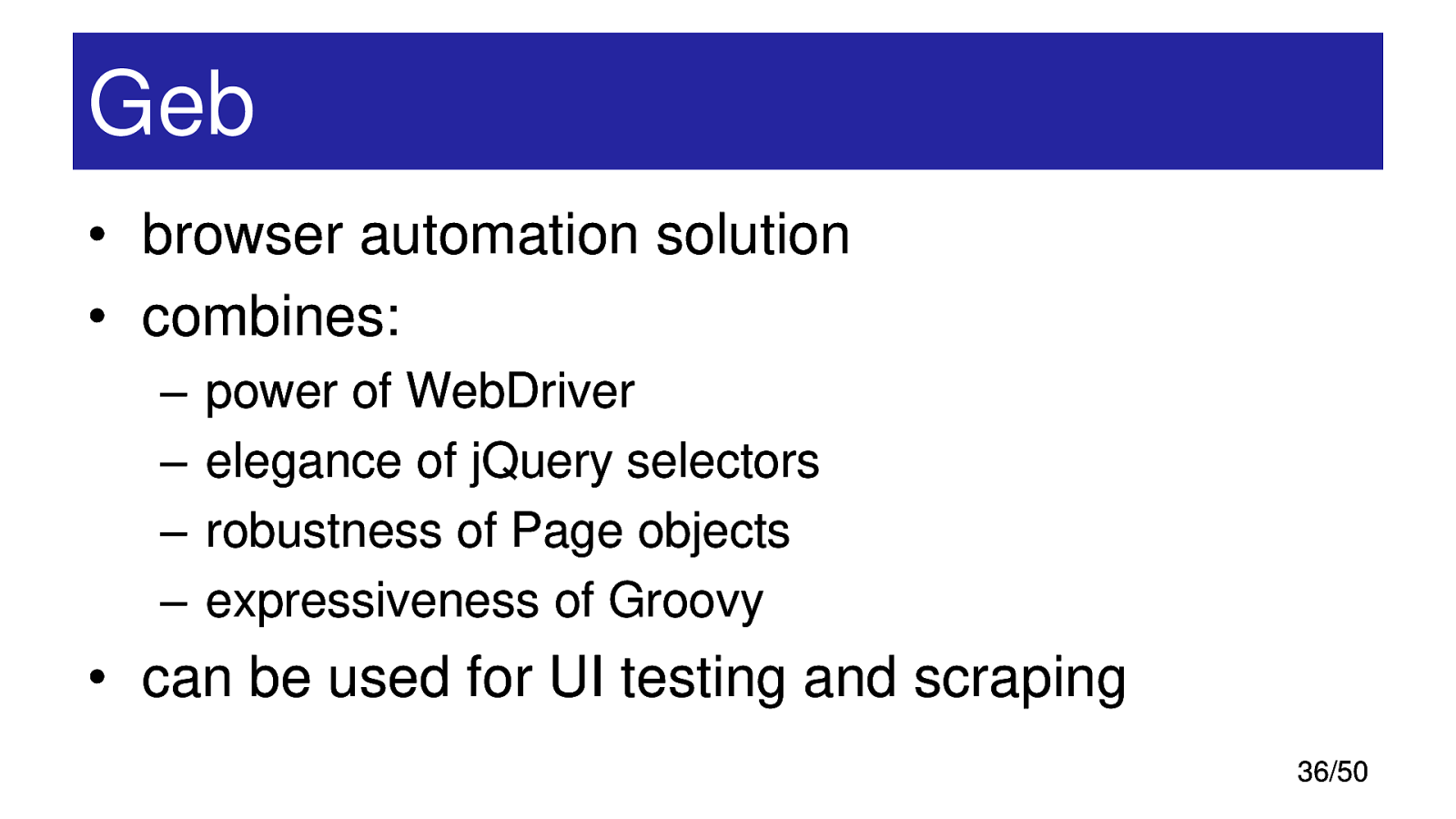
Geb • browser automation solution • combines: – – – – power of WebDriver elegance of jQuery selectors robustness of Page objects expressiveness of Groovy • can be used for UI testing and scraping 36/50
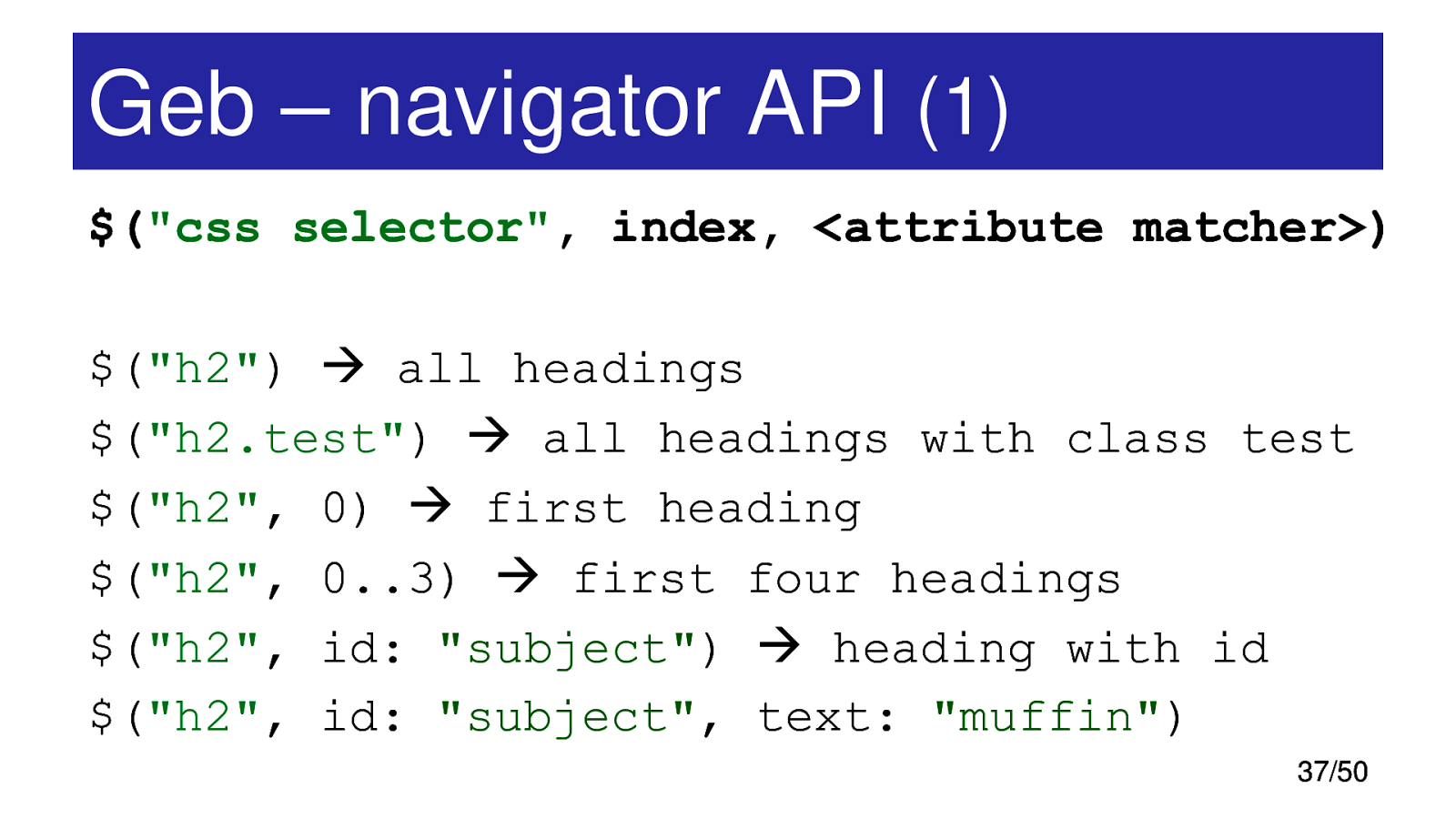
Geb – navigator API (1) $(“css selector”, index, <attribute matcher>) $(“h2”) all headings $(“h2.test”) all headings with class test $(“h2”, 0) first heading $(“h2”, 0..3) first four headings $(“h2”, id: “subject”) heading with id $(“h2”, id: “subject”, text: “muffin”) 37/50
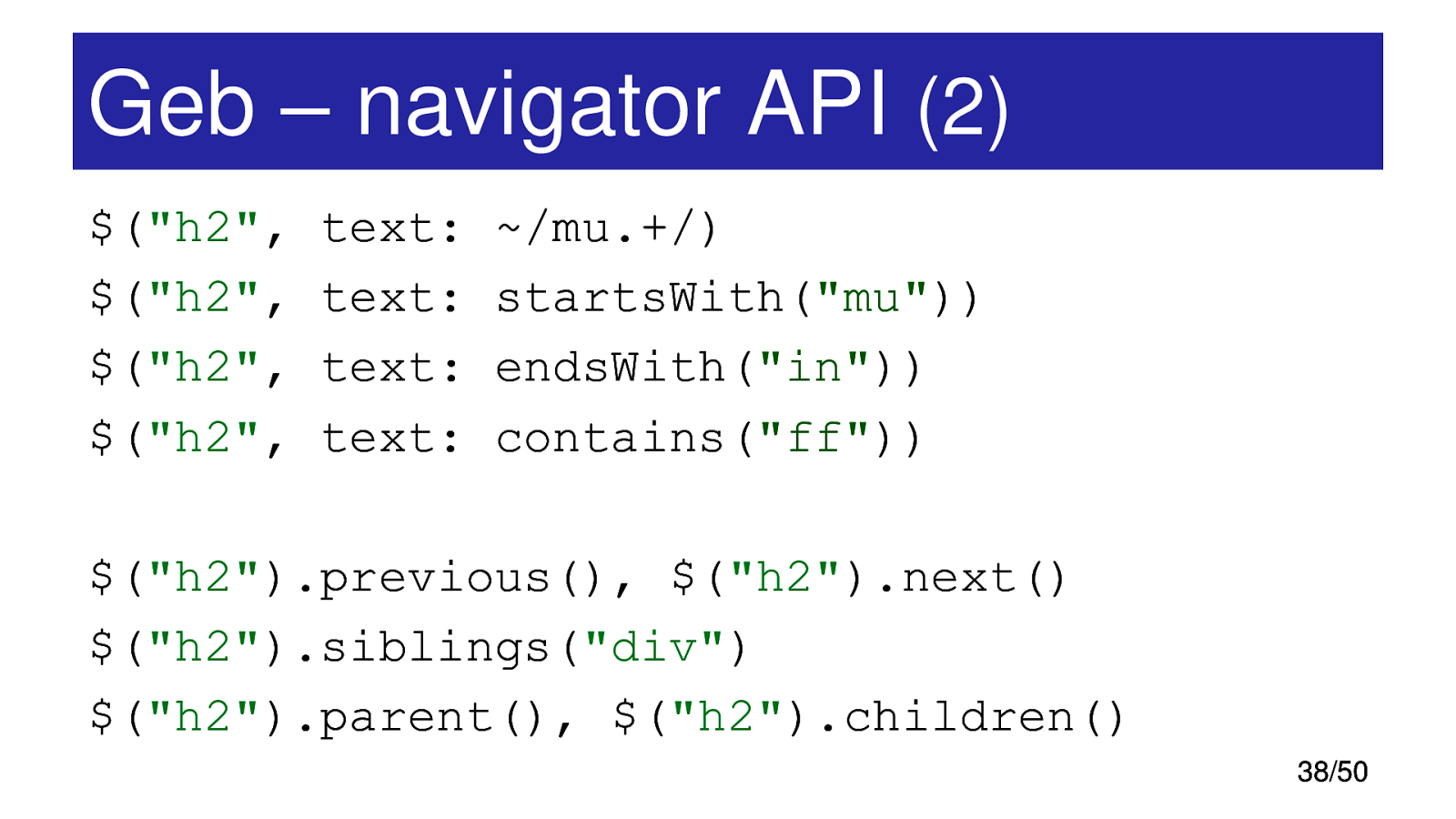
Geb – navigator API (2) $(“h2”, $(“h2”, $(“h2”, $(“h2”, text: text: text: text: ~/mu.+/) startsWith(“mu”)) endsWith(“in”)) contains(“ff”)) $(“h2”).previous(), $(“h2”).next() $(“h2”).siblings(“div”) $(“h2”).parent(), $(“h2”).children() 38/50
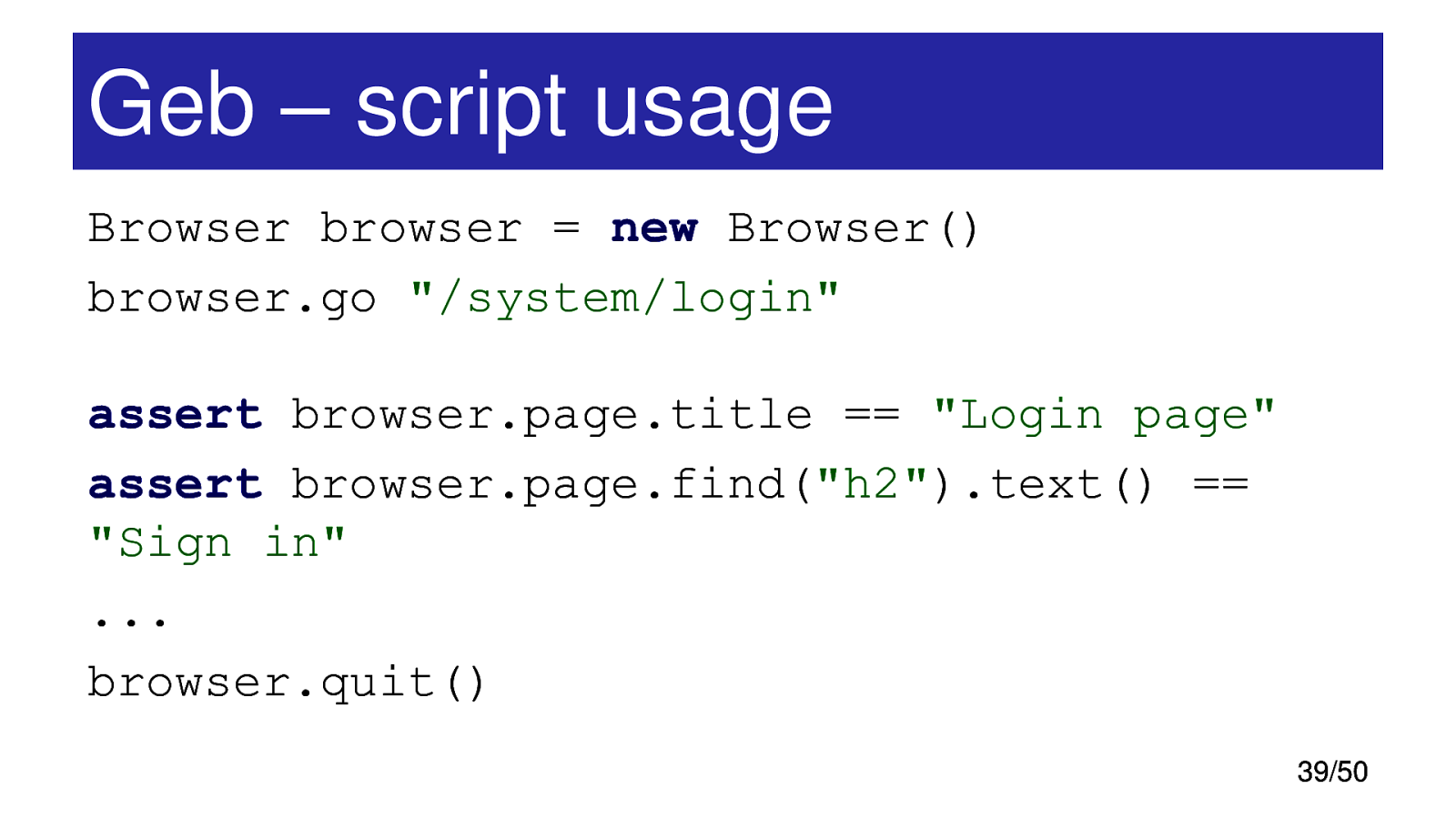
Geb – script usage Browser browser = new Browser() browser.go “/system/login” assert browser.page.title == “Login page” assert browser.page.find(“h2”).text() == “Sign in” … browser.quit() 39/50
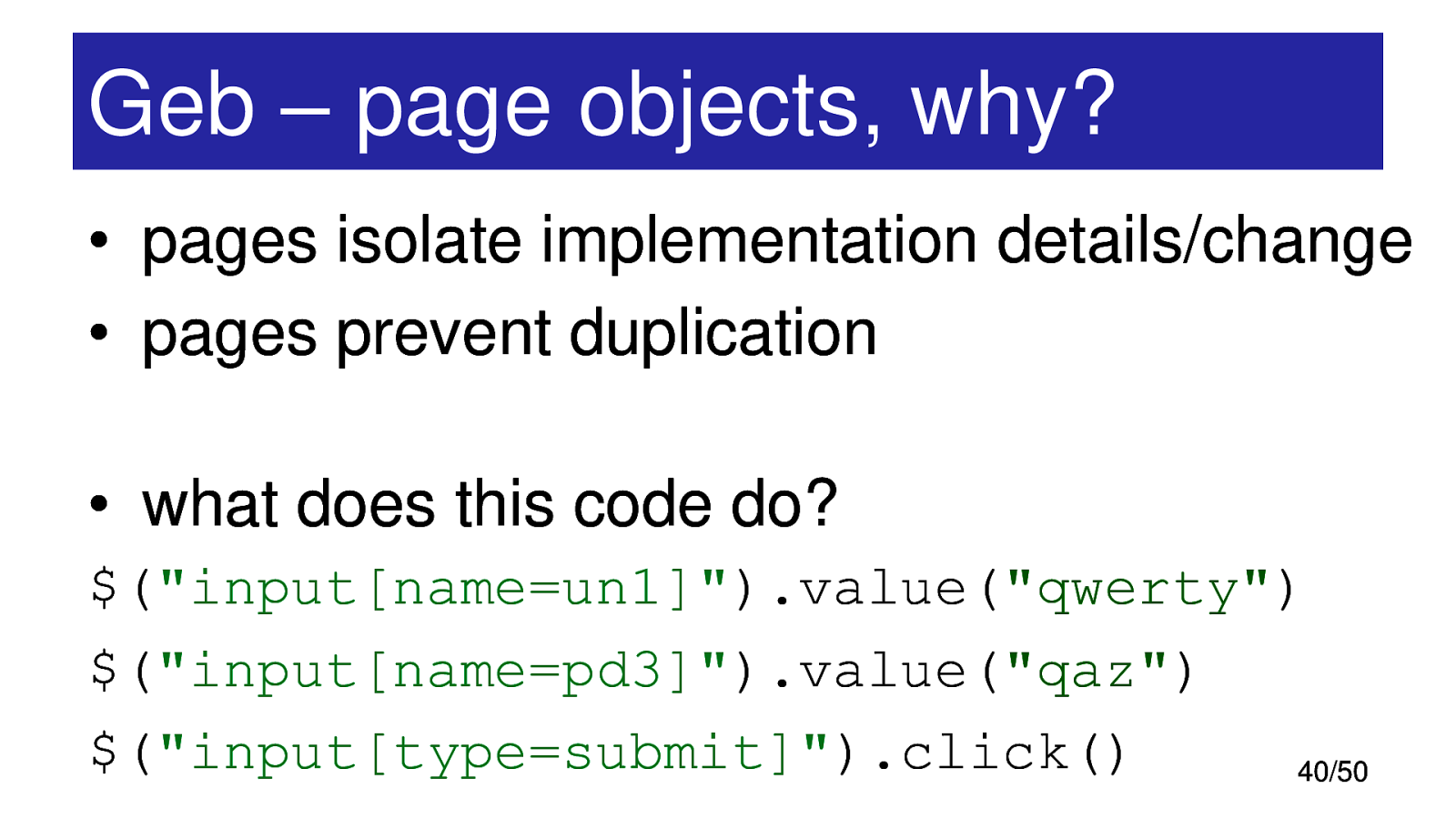
Geb – page objects, why? • pages isolate implementation details/change • pages prevent duplication • what does this code do? $(“input[name=un1]”).value(“qwerty”) $(“input[name=pd3]”).value(“qaz”) $(“input[type=submit]”).click() 40/50
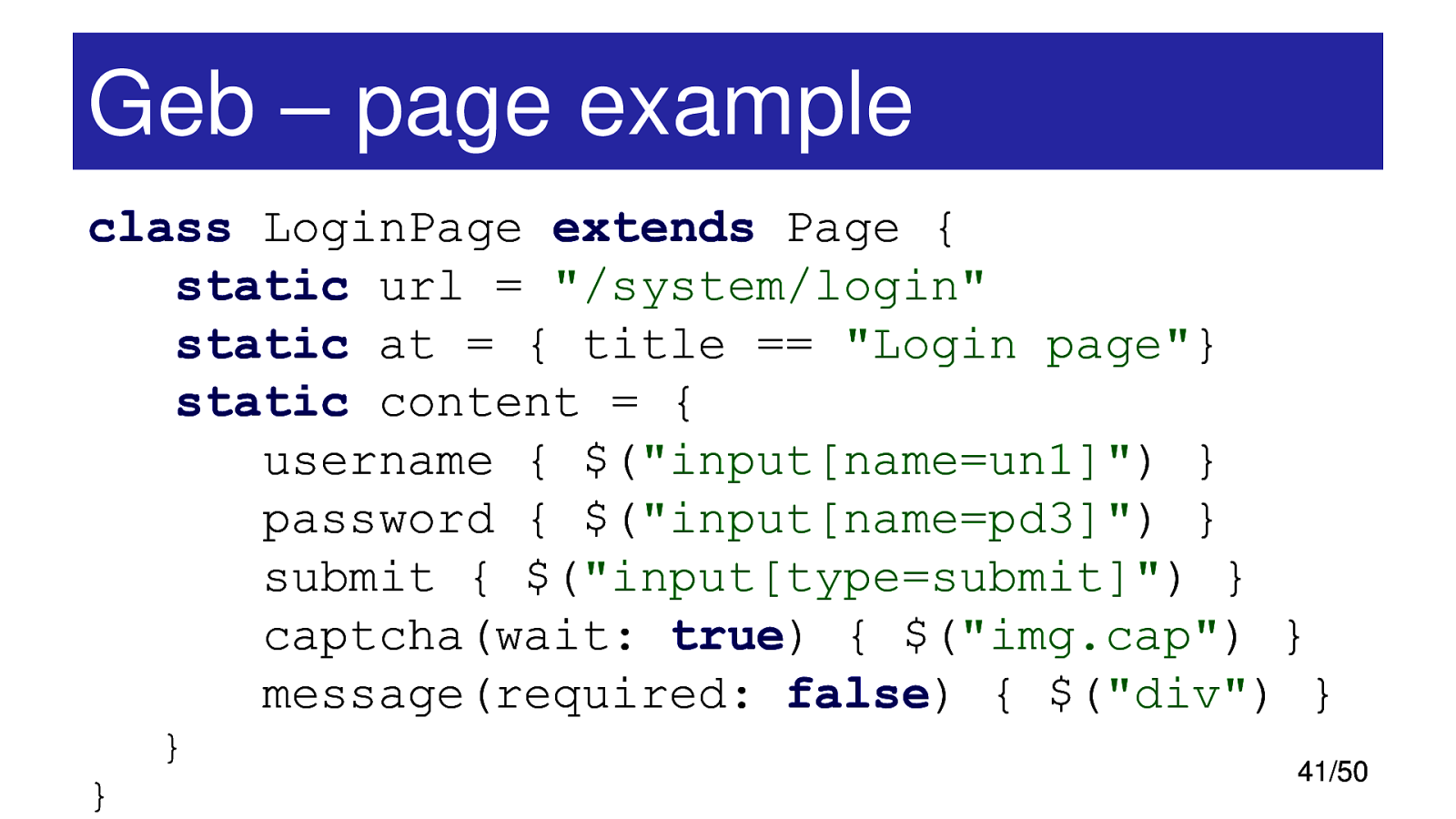
Geb – page example class LoginPage extends Page { static url = “/system/login” static at = { title == “Login page”} static content = { username { $(“input[name=un1]”) } password { $(“input[name=pd3]”) } submit { $(“input[type=submit]”) } captcha(wait: true) { $(“img.cap”) } message(required: false) { $(“div”) } } } 41/50
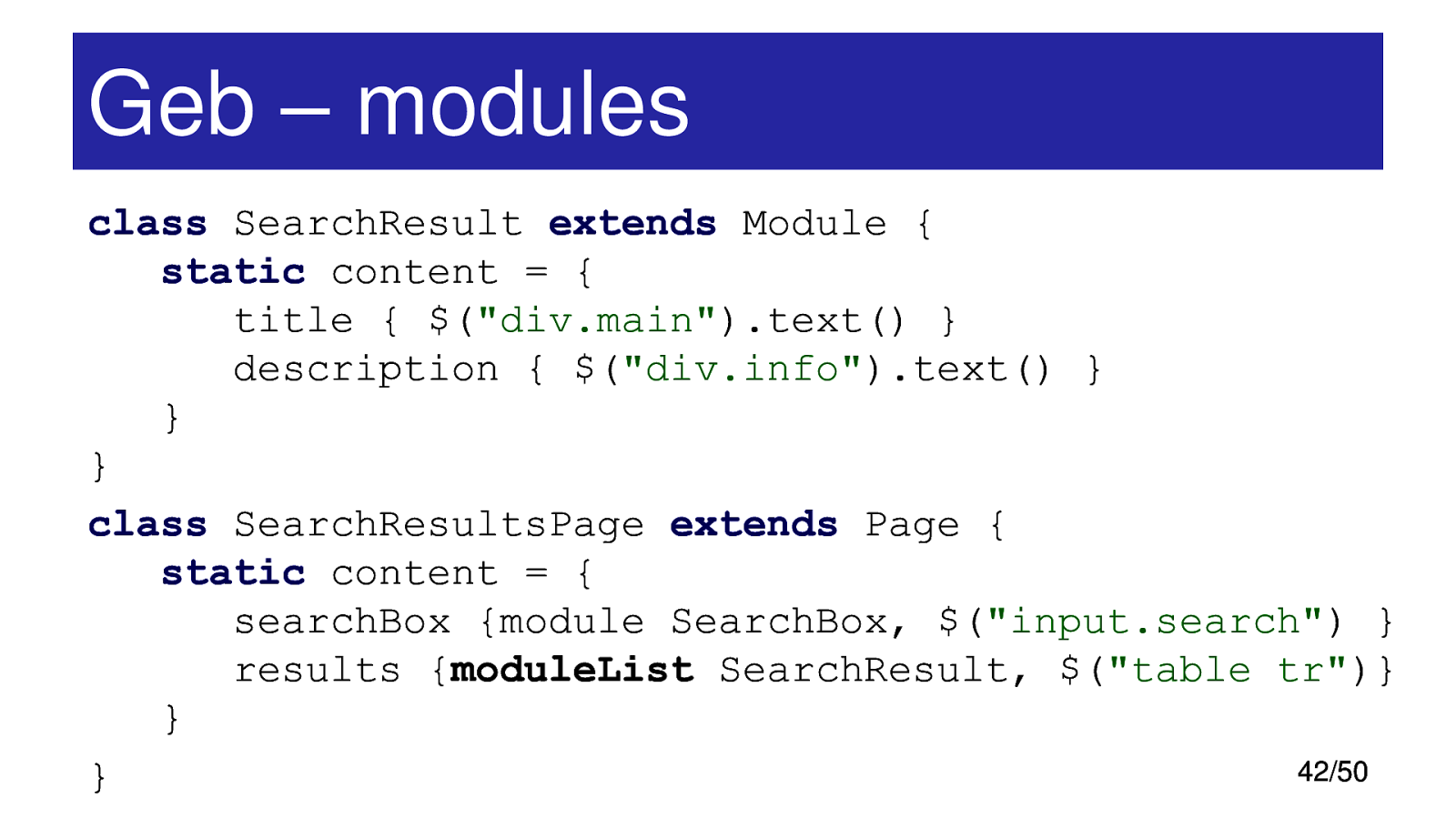
Geb – modules class SearchResult extends Module { static content = { title { $(“div.main”).text() } description { $(“div.info”).text() } } } class SearchResultsPage extends Page { static content = { searchBox {module SearchBox, $(“input.search”) } results {moduleList SearchResult, $(“table tr”)} } 42/50 }
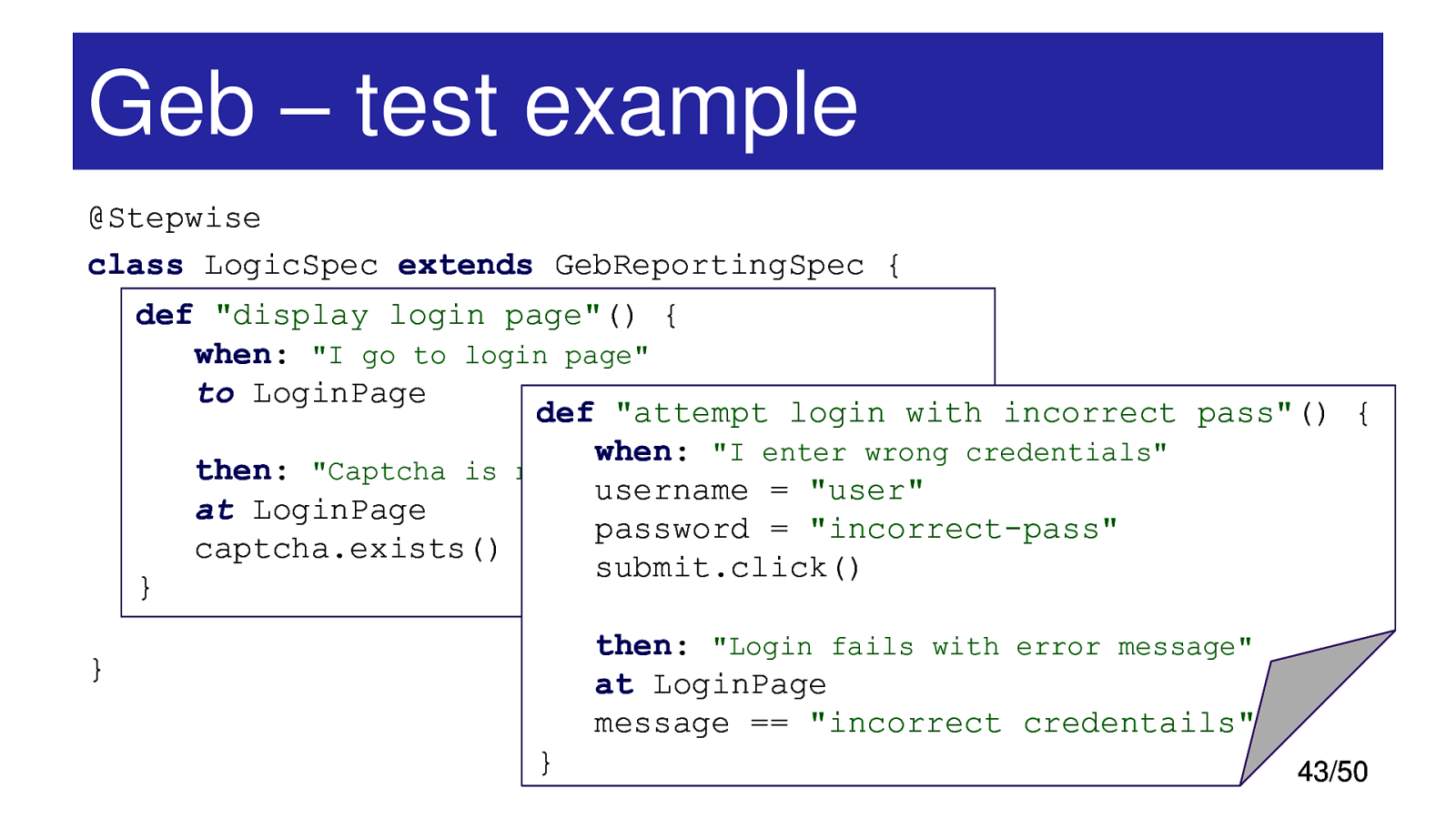
Geb – test example @Stepwise class LogicSpec extends GebReportingSpec { def “display login page”() { when: “I go to login page” to LoginPage def “attempt login with incorrect pass”() { when: “I enter wrong credentials” then: “Captcha is rendered” username = “user” at LoginPage password = “incorrect-pass” captcha.exists() submit.click() } then: “Login fails with error message” at LoginPage message == “incorrect credentails” } } 43/50
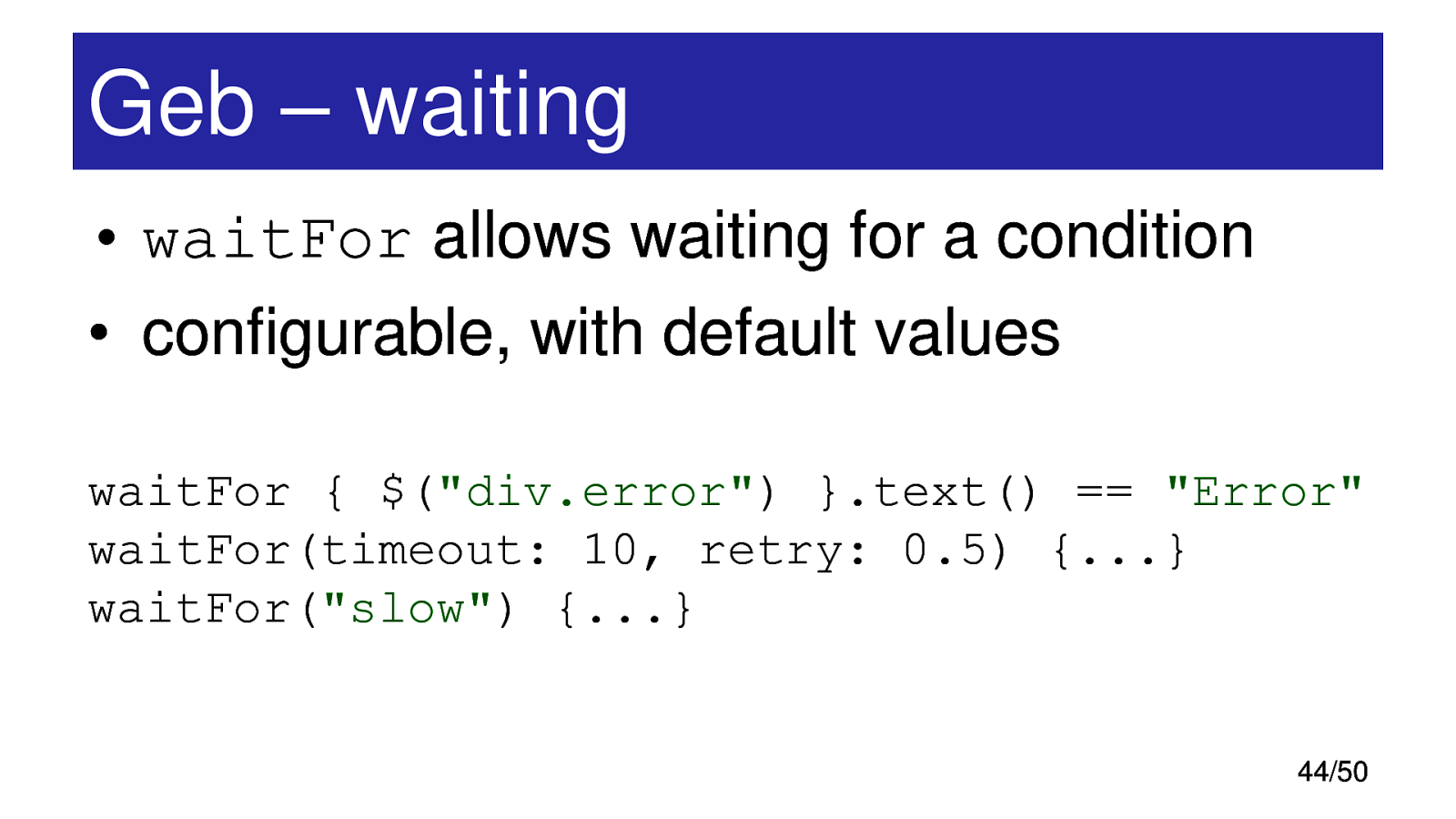
Geb – waiting • waitFor allows waiting for a condition • configurable, with default values waitFor { $(“div.error”) }.text() == “Error” waitFor(timeout: 10, retry: 0.5) {…} waitFor(“slow”) {…} 44/50
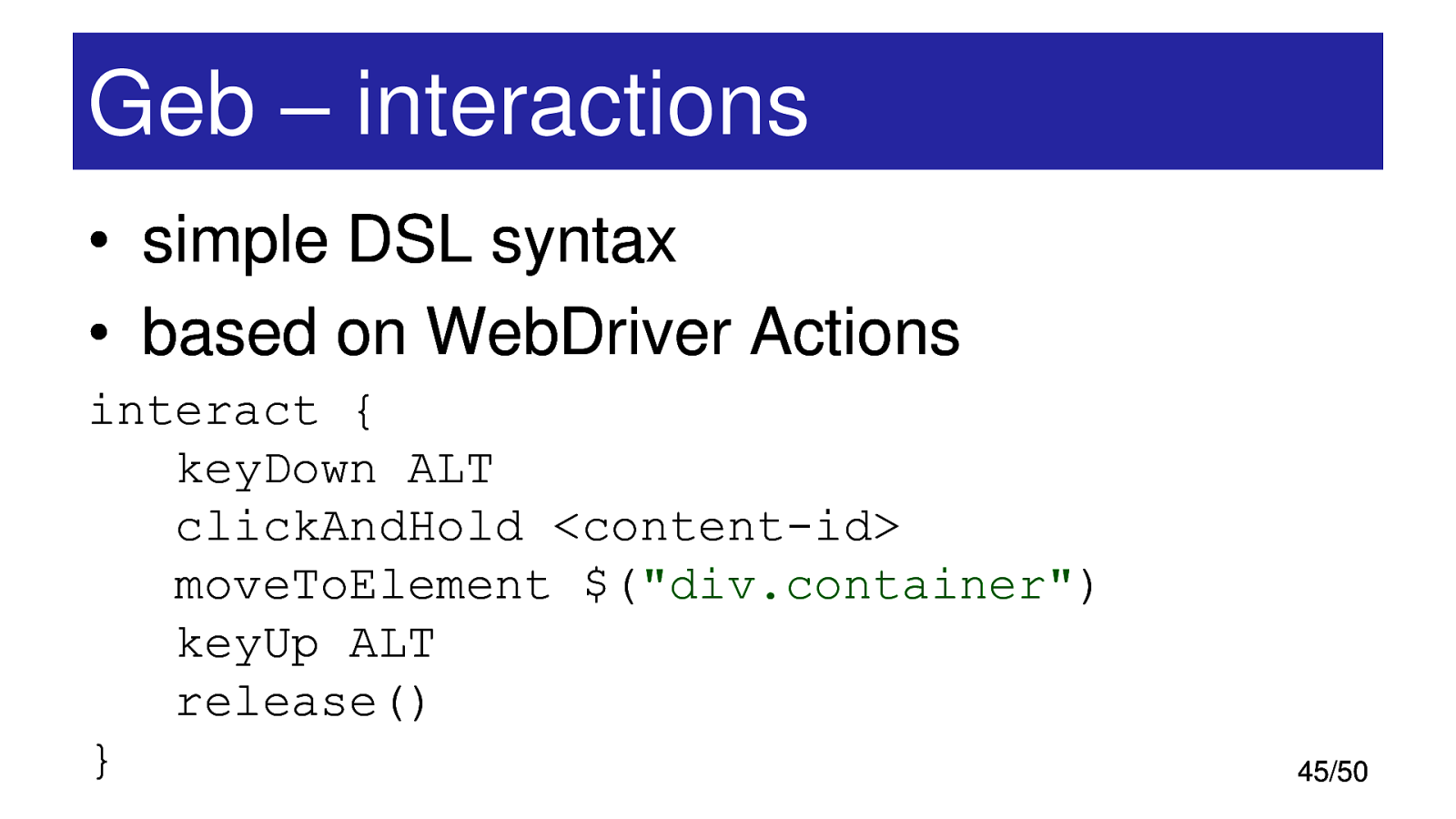
Geb – interactions • simple DSL syntax • based on WebDriver Actions interact { keyDown ALT clickAndHold <content-id> moveToElement $(“div.container”) keyUp ALT release() } 45/50
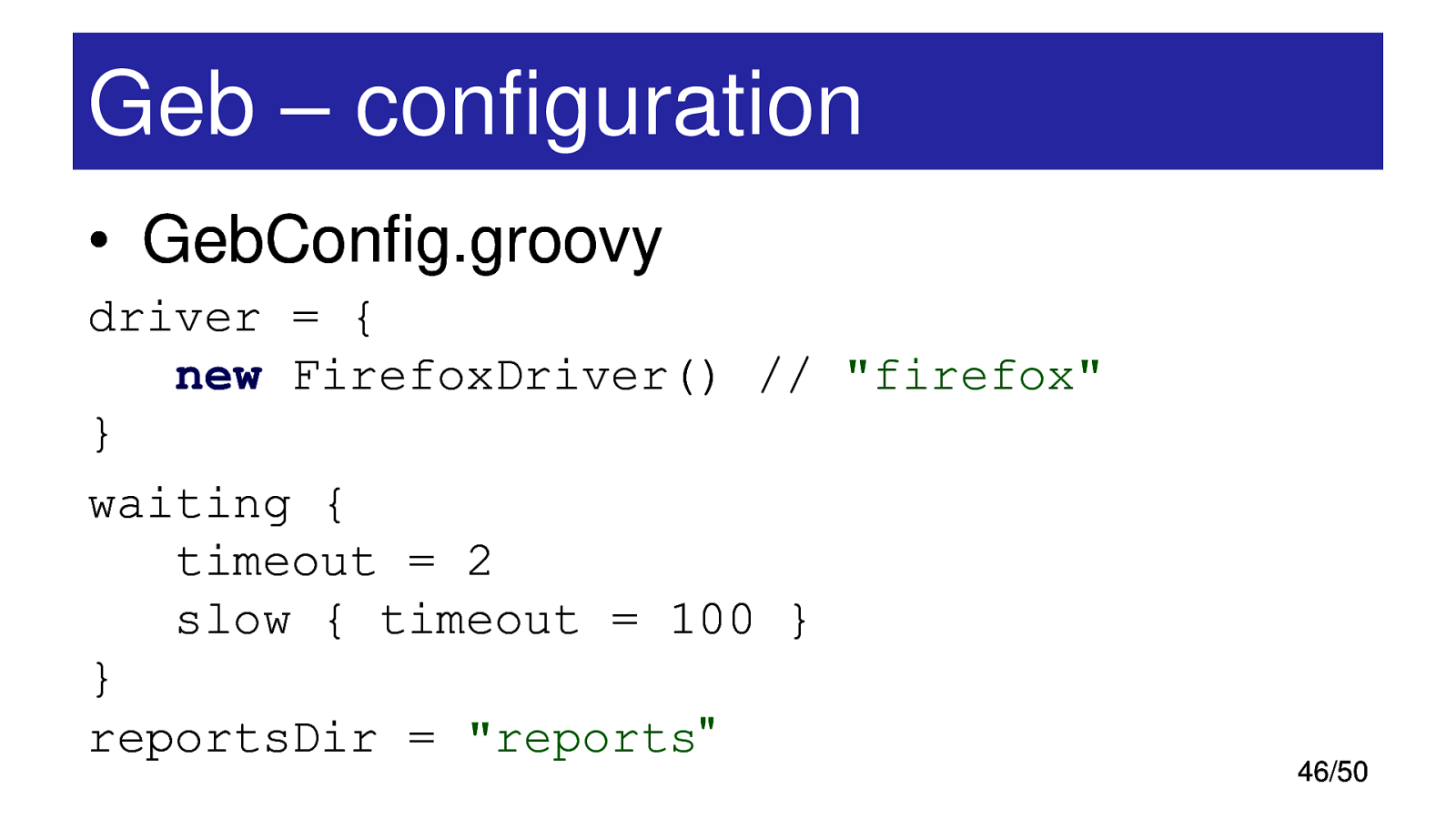
Geb – configuration • GebConfig.groovy driver = { new FirefoxDriver() // “firefox” } waiting { timeout = 2 slow { timeout = 100 } } reportsDir = “reports” 46/50
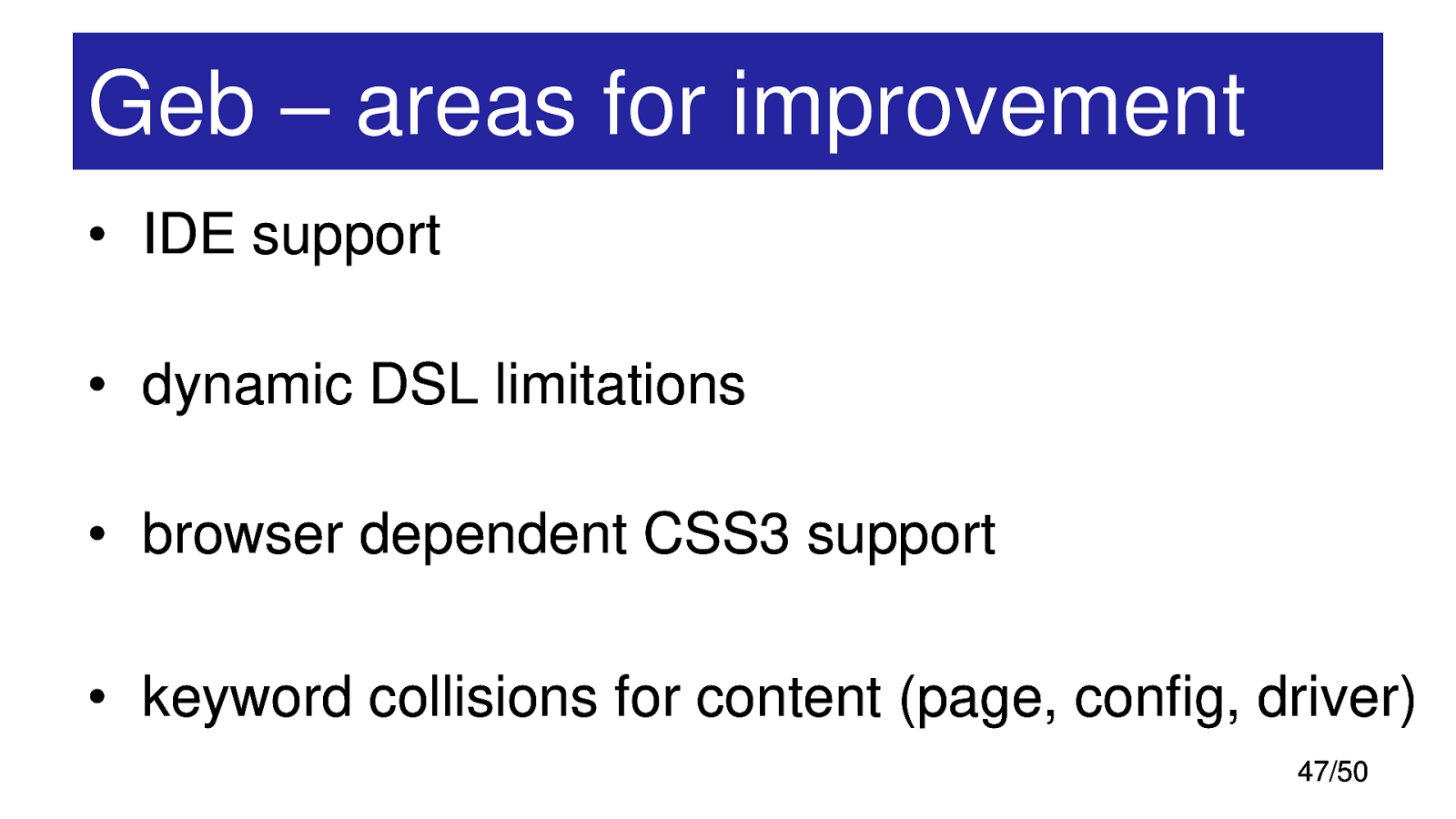
Geb – areas for improvement • IDE support • dynamic DSL limitations • browser dependent CSS3 support • keyword collisions for content (page, config, driver) 47/50


Thank You! Petyo.Dimitrov@musala.com Associate Software Architect, Musala Soft

Q&A